By Carles Prats.
Introduction
Republican labor camps and prisons are much less known that Francoist concentration camps and jails, because they lasted much less in time and concerned much less people. But brutality was similar in detention centers of both sides fighting the civil war.
Some of these Republican prisons or camps are often remembered as Francoist detention centers, because it is generally ignored that previously they served to the same purpose for Republicans. We can mention Almería’s provincial prison, known as ‘El Ingenio’, or Madrid’s General Porlier street prison. Even Albatera Republican labor camp was reused by Francoists as a concentration camp, known as ‘Almond trees Camp’ under their rule.
This work focuses on the toughest Republican labor camps postal history, those ruled by the Servicio de Información Militar (SIM), which was the military intelligence agency of the Second Spanish Republic. This is a specialty in the specialty of postal history from the Republican penitentiary system.
The pieces we study on this work undoubtedly give high added value to any collection containing even just one of them. This kind of pieces are so rare, that we will reproduce below all the known covers, post cards and stationery post cards related to the SIM’s labor camps system.
This is the rarest field of the whole Spanish civil war postal history, and one of the rarest of the Spanish postal history in general.
Brief historical review of the Republican labor camps system
On December 1936, the Republican government created a system of labor camps for ‘condemned in the rebel movement, to make public works able to resolve the problems of the regions where the camps are settled’ (Gaceta de la República núm. 362, Dec 27, 1936, pages 1118 & 1119).
These camps had to bee an alternative to prisons, where prisoners should be redeemed for work. The camps hosted a wide variety of political prisoners, deserters, undisciplined, right-wing people, religious, rebel military POWs and even civilian from areas retaken by the Republican army.
The treatment received by inmates was very different in some and other camps. While those ruled by the Prisons Office depending on the Ministry of Justice treatment was correct, those under Servicio de Información Militar (SIM) were famous for an inhumane treatment to the prisoners, and arbitrary executions where common there.
There are few documentary references about this kind of detention centers, but the list of Republican camps can be reconstructed through analyzing several sources. Here is the list of those we could get references about:
ALICANTE:
Albatera labor camp: it was stablished on September 6, 1937 (Gaceta de la República, nr. 252, Sep 9, 1937, page 995). In later times, documents refer to this camp as ‘Campo de Trabajo del Segura, sección de Albatera’ (Gaceta 147, May 27, 1938, page 1056, & Gaceta 150, June 5, 1938, page 1202).
San Juan labor camp: it was stablished on Dec 20, 1937 (Gaceta de la República nr. 855, Dec 21, 1937, page 1334).
Calpe labor camp: stablished on Feb 19, 1938 (Gaceta de la República nr 53, Feb 22, 1938, pages 972 & 973)
Muchamiel women’s prison: Centro Documental de la Memoria Histórica, signature PS-MADRID,681,5.
Orihuela labor camp: we only know the existence of this camp through covers and post cards sent from it, with no other documentary reference. Being close to Albatera, it could also be part of ‘Campos de Trabajo del Segura’ mentioned before, being its base in Albatera. It was in San Miguel seminary.
San Vicente del Raspeig labor camp: known thanks to a cover sent to this camp and through documents in Centro Documental de la Memoria Histórica, signature PS-MADRID,1662,29.
Segura de Benidorm labor camp: mentioned in some documents in Centro Documental de la Memoria Histórica, signature PS-MADRID,1662,32
ALMERÍA:
Almeria labor camp: Centro Documental de la Memoria Histórica, signature PS-MADRID,208,35.
Venta Araoz labor camp: only referenced on a document in Centro Documental de la Memoria Histórica, signature PS-MADRID,1131,7
CUENCA
El Carrizal de Tarancón labor camp: known thanks to documents in Centro Documental de la Memoria Histórica, signature PS-MADRID,1662,43.
MADRID
Alcalá de Henares, Casa de Trabajo labor camp: it was stablished in 1934 to host sentenced upon Lazy and Crook Law, passed by the Parliament the year before. At the beginning of the civil war, Casa de Trabajo was emptied of common prisoners to host right-wing people and rebel military, becoming a labor camp.
MURCIA:
Totana labor camp: it was stablished on Dec 28, 1936 (Gaceta de la República nr 365, Dec 30, 1936, page 1156)
Cehegín, Casa de Reforma labor camp: it occupied Maravillas convent ‘to host people sentenced to labor camp internment, or other, for offenses of disaffection or endangering the regime’ (Gaceta de la República nr 49, Feb 2, 1938, page 910). It was stablished on Feb 1, 1938.
TERUEL:
Valmuel labor camp: only mentioned on document with signature PS-MADRID,684,6 in Centro Documental de la Memoria Histórica.
ZARAGOZA:
Caspe labor camp: references in Centro Documental de la Memoria Histórica, signature PS-MADRID-1091,10
CATALONIA:
In 1936, six labor camps were created to decongest prisons, chekas (irregular detention centers) and prison ships ruled by the Servicio de Información Militar. The same SIM was in charge of these camps, identified with a number:
Labor camp number 1: it was in Poble Espanyol, Montjuïc, Barcelona. Poble Espanyol were the buildings where the 1929 Exhibit took place. These buildings, along with Muntaner 55, also in Barcelona, hosted the SIM’s offices.
Labor camp number 2: it was in Hospitalet de l’Infant, with an accessory camp in Tivissa. It was later moved to Montferrer and La Seu d’Urgell.
Labor camp number 3: it was in Omells de Na Gaià and later moved to Vilasana & Cabó.
Labor camp number 4: in Concabella, and later moved to Barbens.
Labor camp number 5: in Ogern, near Bassella, and later moved to Anglesola.
Labor camp number 6: in Falset, with an important accessory camp in Cabassers and detachments in Gratallops, La Figuera and Porrera. Later moved to Arbeca and merged with Labor camp number 3 in Cabó.
Out of the SIM’s structure, there was in Catalonia another labor camp, in Pelosa beach (Roses), managed by the Prisons Office of the Ministry of Justice, and Clariana camp, which was actually Republican army’s Disciplinary Battalion number 5.
The study of Catalan labor camps is widely documented in Francesc Badia’s book ‘Els camps de treball a Catalunya durant la guerra civil (1936-1939), Publicacions de l’Abadia de Montserrat, 2001.
The main tasks of the prisoners in the Catalan camps was the fortification of zones close to the camps, and communication with the outside world was subject to a severe control. In most camps -there are exceptions- each prisoner could only send two post cards per month to his closest family, with a text no longer than 20 words, on a post card to make easy for the censorship to review it, and the text could only greet the addressee and say the sender was in good health. It was strictly prohibited to write about anything else or to reveal where the camp in which he was interned was.
On the other hand, there were no restrictions on incoming mail, but each camp had its own norms on this. While in some camps prisoners could receive long letters in covers and even packets with clothing, food or stamps and post cards to reply, in others correspondence addressed to prisoners had to be written on post cards with the same word limit than the outgoing mail.
In Albatera camp there was a peculiarity on correspondence received by prisoners: it has no censor marks of any kind. But that outgoing does (the only example we have seen is on a post card)
In Catalonia, the odyssey of those interned in labor camps ended when they crossed the French border on early February 1939. This brought liberty to them and exile to their guards. In the Spanish Levant, the camps ended with the Francoist occupation, and some were used as concentration camps as well by the rebel army, to enclose those of the other side.
RARITY OF THE PIECES
Postal effects circulated from or to Republican labor camps are extremely rare, and very few privileged collections have some example of this kind of postal history. The most extreme rarities are pieces circulated to prisoners in SIM camps (all those in Catalonia), ‘chekas’ (irregular detention centers) or ‘preventorios’ (provisional prisons for those awaiting trial). Their rarity is so extreme that only eight examples are known to exist: three covers and three stationery post cards received by prisoners in the camps (one stationery post card and one cover returned to sender) and two stationery post cards to an inmate in prison ship ‘Uruguay’, which was “Preventorio E’ under the SIM.
La Pelosa labor camp, in Roses, is a case apart; only one post card is known sent from it.
We have never seen any piece froom San Juan and Calpe labor camps, both in Alacant.
DOCUMENTARY SOURCES TO IDENTIFY ADDRESSEES AND SENDERS
Unfortunately we don’t have complete lists with the names of those held prisoners in the camps, neither of officers and guards serving there. Despite this, we have partial lists, which are the only help to identify senders and addressees of the postal effects we study here.
The best source to identify labor camp guards is an order by Government Ministry of May 19, 1938, published in Gaceta de la República nr 154, June 3, 1938 (pages 1177 to 1181). It contains the appointment of 777 labor camp guards. They do not appear on alphabetical order, but it mostly resembles a consecutive publication of three different lists merged in one.
Other orders appointing or ceasing labor camp guard corps officers in the following Gacetas:
Nr 103, April 13, 1938, page 290
Nr 139, May 19, 1938, pages 944-945
Nr 145, May 25, 1938, page 1034
Nr 249, Sept 6, 1938, page 1093
Nr 253, Sept 10, 1938, page 1177
Nr 265, Sept 22, 1938, pages 1376-1377
Nr 269, Sept 26, 1938, page 1433
Nr 314, Nov 10, 1938, pages 507-508
Nr 344, Dec 10, 1938, pages 1033-1034
All these documents can be found on the Internet, on the historic collection of the Gazeta, in the website of the Spanish Official State Bulletin:
https://www.boe.es/buscar/gazeta.php
For a partial list of inmates in the Catalan labor camps, you can see Frances Badia’s work ‘Els camps de treball a Catalunya durant la Guerra Civil (1936-1939), Publicacions de l’Abadia de Montserrat, 2001, appendice 19, pages 394/450.
For a partial list of those killed under the Frente Popular government in Barcelona, Madrid and Valencia, see appendices on César Alcalá works ‘Checas de Madrid’ and ‘Checas de Valencia’, and on the book by César Vidal ‘Checas de Barcelona’. Sometimes it is possible to identify senders or addressees of Republican labor camps postal history pieces through the lists of those killed
Bibliography:
Gaceta de la República
Francesc Badia: Els camps de treball a Catalunya durant la Guerra Civil (1936-1939), Publicacions de l’Abadia de Montserrat, 2001
Joan Samper: Los Campos de Trabajo republicanos en Catalunya durante la Guerra Civil, Monografías Filatélicas nº 20, 2016
César Alcalá: Checas de Barcelona, Ed. Belacqua, Barcelona 2005
César Alcalá: Checas de Valencia, Ed. Styria, Barcelona 2006
César Vidal, Checas de Madrid, Planeta DeAgostini, Barcelona 2007
KNOWN POSTAL HISTORY PIECES RELATED TO THE SIM’S LABOR CAMPS SYSTEM
This article focuses on the specialty of the specialty: the postal history pieces sent from or to Servicio de Información Militar penitentiary system, which is a part of the Republican labor camps and prisons postal history. This chapter of the postal history is so rare that we can list all known pieces on this article, and we are going to do so. Just for clarification, the SIM ruled its own penitentiary service inside the Republican prisons system. Death rate on the SIM’s camps and prisons was extremely high, with arbitrary executions and due also to the bad living conditions of its installations. Post cards and covers sent to inmates are more rare that those sent out by them for an obvious reason: the incoming mail had to suffer the same miseries than its addressees, and its fate was linked to the addressee fate: if the prisoner was killed, his belongings were thrown away. Usually, the simple existence of mail received by prisoners mean they survived to their imprisonment. On the other hand, mail sent by inmates is more likely to have survived, as its conservation conditions were very different.
All covers and post cards received by SIM prisoners we have seen show the footprint of hard living conditions: they are creased, dirty, with stains, with worn down corners, being all these signs a sample of what these pieces of mail had to see in the receivers’ shirt pockets while digging trenches or opening new roads with pick and shovel, or in their miserable barracks, cells or churches converted into prisons where they rested a few hours before being awaken with butt blows to return to their slave work.
You can find below a list with images of all known pieces of postal history sent from or to SIM’s labor camps and ‘Preventorios’, all in Catalonia, between mid 1938 and February 1939.
As they are extremely rare, we have found appropriate to add pictures of all of them. If in the future more pieces of correspondence related to the SIM’s labor camps and prisons system are discovered, this article will be updated.
PREVENTORIO A, Montjuïc Castle, Barcelona
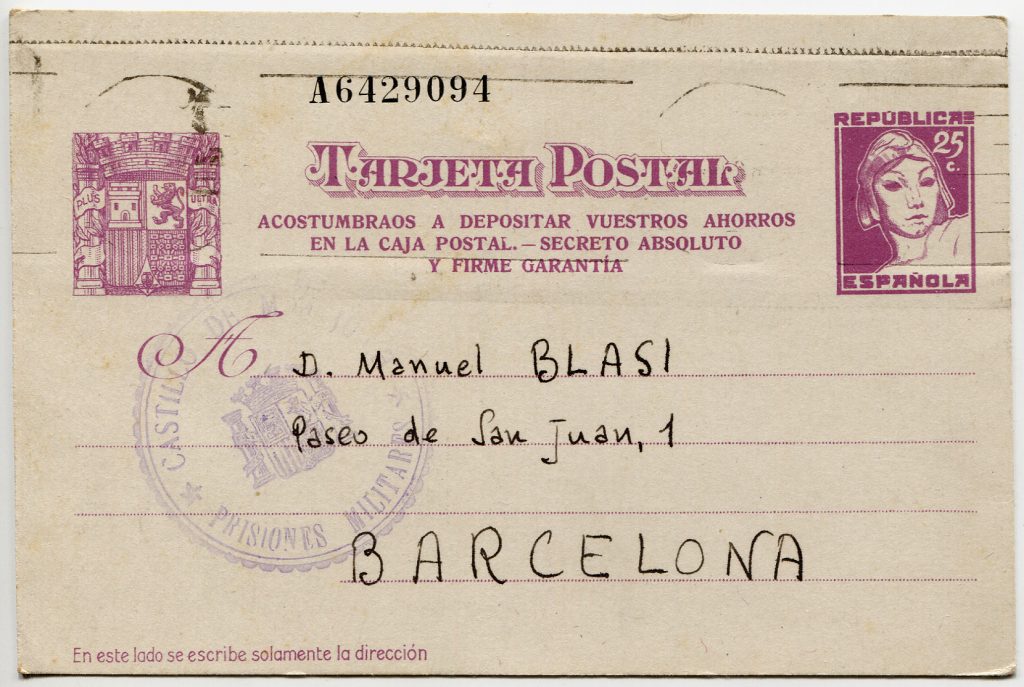
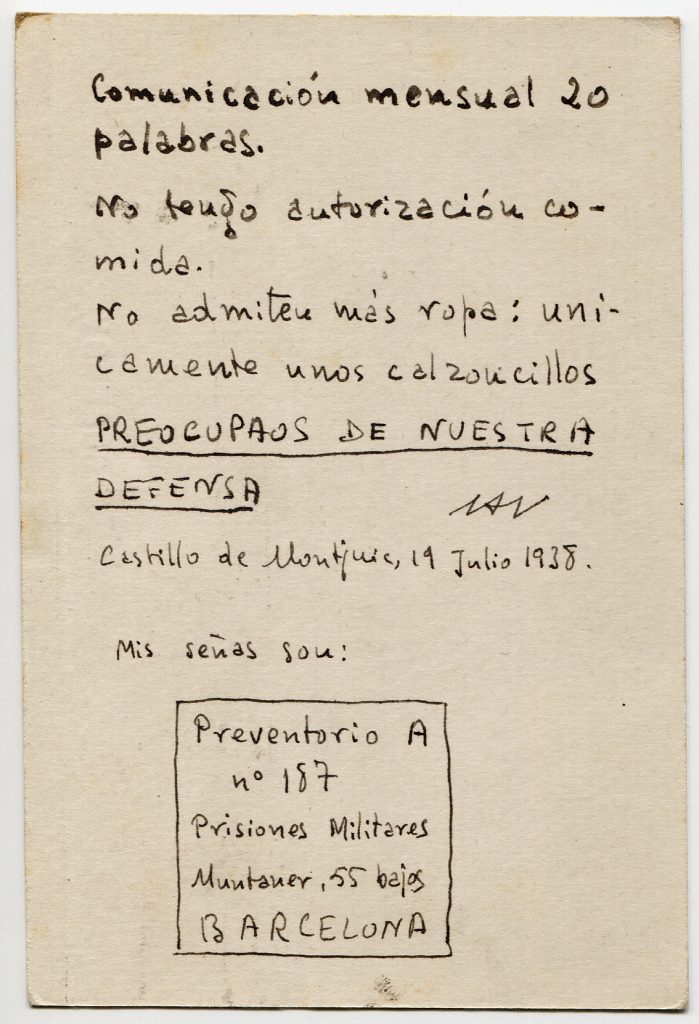
This post card is a clear example of the tight communication conditions that the Republican Servicio de Información Militar imposed upon prisoners while in certain detention centers, specially those called “Preventorios”: only one post card per month was allowed wiht a maximum of 20 words, as noted by Francesc Badia in his book “Els camps de treball a Catalunya durant la guerra civil (1936-1939), pages 143 & following. The sender of this post card is Ferran Blasi Mora, identified by his signature and thanks to another post card sent from a prison in Girona , not related with the SIM and thus excluded from this study (see colectalia.com, lot -or Certificate of Authenticity if the lot has sold out when you search it- CT130).
Transcription:
Comunicación mensual 20 palabras. No tengo autorización comida. No admiten más ropa: únicamente unos calzoncillos. PREOCUPAOS DE NUESTRA DEFENSA
Castillo de Montjuic, 19 Julio 1938.
Mis señas son: Preventorio A nº 187, Prisiones Militares, Muntaner, 55 bajos, BARCELONA
Translation:
Monthly communication of 20 words. Food not authorized. No more clothes admitted: only a pair of socks. TAKE CARE OF OUR DEFENSE. Montjuïc Castle, July 19, 1938. Preventorium A. Nr. 187. Military Prisons. Muntaner 55, floor. Barcelona.
On the front there is a mark “CASTILLO DE MONTJUIC / PRISIONES MILITARES”. Muntaner 55 was the address used as mail office by SIM officials, and all correspondence addressed to prisoners had to be sent there, from where it was redirected to Preventories or Labor Camps.
PREVENTORIO C, Barcelona Seminar, Diputació 231


Improvised post card from SIM’s Preventorio C, in Barcelona Seminar, Diputació 231 (see La Vanguardia, Oct 5, 1937, page 7). The sender’s address is ‘Muntajer 55 bajos’ in Barcelona, this is, SIM’s post office in the city where correspondence to labor camps or ‘preventorios’ had to be addressed, to be redirected to the prisoners wherever they were. Franked with Edifil 749 and Barcelona local surcharge stamp Edifil 19. Roller postmark with unreadable date, but text on the back dated on Aug 11, 1938. Handwritten mark ‘C’ with red pencil for ‘Censura’. The text fits the strict instructions for SIM’s detainees: text with 20 words. The sender asks the reply to have the same length.
Transcription of the text:
Barelona, 11 agosto 1938. Sin noticias tuyas. Escribe veinte palabras postal. Mándame calcetines, calzoncillos, papel retrete y 25 pts. giro postal. Abrazos, Pepe. Remitente José González Juan, Preventorio C. Prisiones Militares. Muntaner 55 bajos.
Translation of the text:
Barcelona, August 11, 1938. No news from you. Send post card with twenty words. Send socks, underpants, toilet roll, and 25 pts through money order. Hugs, Pepe. Sender: José González Juan, Preventorio C. Military Prisons. Muntaner 55 bajos.


Postal stationery Edifil 77N sent from Preventorio C in Barcelona (the Seminar). Unreadable date on the postmark, but text on the back dated on Oct 9, 1938. Sender’s info on the back: Juan Jorba , Preventorio C, Muntaner 55, Piso Principal (sala 1ª)
Transcription of the text:
Queridísima madre, estoy bien en Barcelona, en el Preventorio C. Puedes mandarme paquete comida a calle Muntaner 55. Recuerdos a todos, Juan Jorba. Juan Jorba, Preventorio C – Muntaner 55, Piso Principal (sala 1ª)
Translation:
Dearest mother, I am all right in Barcelona, in Preventorio C. You can send me food to 55 Muntaner street. Regards to all, Juan Jorba. Juan Jorba, Preventrio C – Muntaner 55, Piso Principal (sala 1ª)
Big stains that make difficult to read the text.
PREVENTORIO E, prison ship ‘Uruguay’ in Barcelona harbor

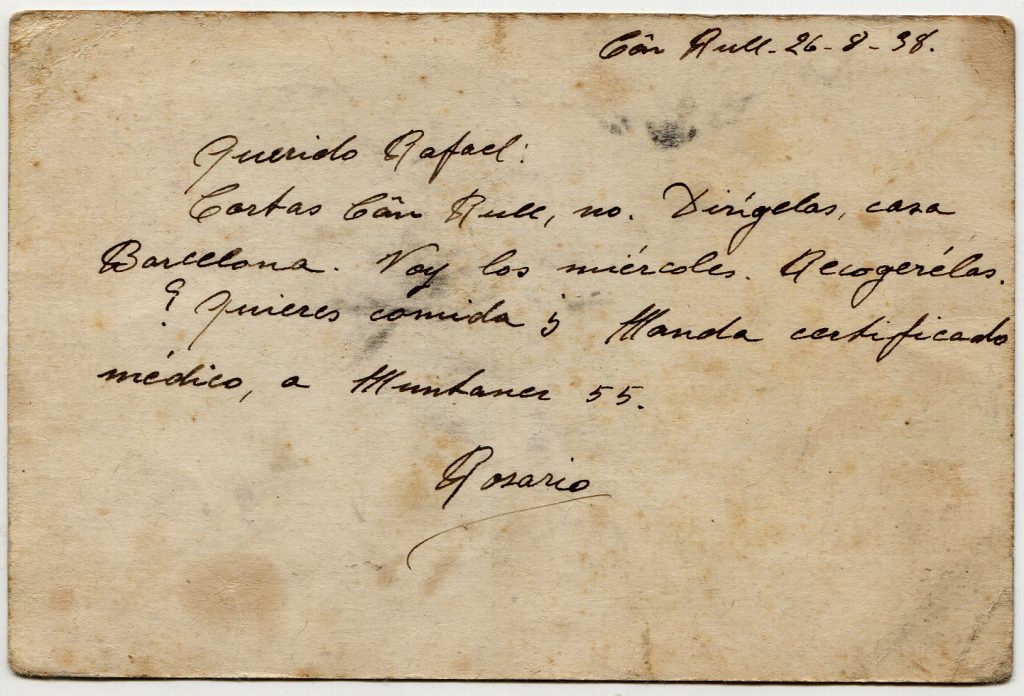
Stationery post card Edifil 77n addressed to Preventorio E “Uruguay”, this is, the steamship Uruguay in Barcelona harbor, used as prison under the SIM administration.
The original name of this steamship was Infanta Isabel de Borbón, it was built in Dumbarton (Scotland) in 1913 and it was acquired by Compañía Transatlántica to offer a regular line Barcelona-Buenos Aires.
In 1934 the steamer was acquired by the government of the Spanish Republic and renamed “Uruguay”. After the failed Catalan declaration of independence of October 6, 1934, the Catalan Government and 2,500 others were jailed in this ship, transformed into a prison.
After the defeat of rebel military in Barcelona during the July 18, 1936 coup, rebel generals Manuel Goded Llopis and Álvaro Fernández Burriel were jailed in this prison ship until their execution.
Uruguay prison ship was under the administration of Servicio de Información Militar (SIM) during the war, and thanks to this post card we know it was labeled “Preventorio E” by the SIM.
The steamer hosted prisoners of very different nature during the war: falangists, fascists, and also ideological enemies of Stalin. Life was hard in the ship: dirt, rats, food shortage and brutal treatment. Many of its prisoners were extrajudiciary executed.
During the air raid against Barcelona’s harbor, on January 16, 1939, the ship was sunk by the rebel air force. Prisoners who could escape the bombing and sinking had different fates: some were liberated, while others were executed. The steamship was refloated after the war, in July 1939, but it never sailed again. Its wreck was sold in 1942.
This stationery post card and the next one are addressed to Rafael Corbella Amat.
The card is uprated with a 5c stamp and has a Sabadell postmark with partially readable date: “AGO 38”. The address has two parts:
Preventorio E. “Uruguay” and Muntaner, 55, bajos, Barcelona. This last address, Muntaner 55, was the SIM’s post office, where the correspondence for prisoners in labor camps and prisons was directed to be forwarded, and where outcoming correspondence was received for delivery to the mail.
The text on the back is dated in Can Rull (a neighborhood of Sabadell) on August 26, 1938. This is the transcription and translation:
Can Rull, 26-8-38,
Querido Rafael,
Cartas Can Rull, no. Dirígelas casa Barcelona. Voy los miércoles. Recogerélas. ¿Quieres comida? Manda certificado médico a Muntaner 55.
Rosario.
It is written in a telegraphic style. Probably, incoming mail for prisoners had a certain word limit for the texts. It is known outgoing texts had limits in most prisons and labor camps ruled by the SIM.
This is the translation:
Can Rull, Aug 26, 1938
Dear Rafael,
No letters to Can Rull. Send them to home in Barcelona. I go every Wednesday to pick them up. Do you want food? Send doctor’s certificate to Muntaner 55.
Rosario.


Stationery post card Edifil 77n addressed to the same prison ship. The card is uprated with a 5c stamp Barcelona and has no postmark. Stamps are cancelled with blue pencil.
The text on the back is dated in Can Rull (a neighborhood of Sabadell) on August 31, 1938. This is the transcription:
Can Rull, 31-8-38,
Querido Rafael,
Seguimos bien. ¿Quieres ropa? Dime cual. Tengo toda la de Pins. Hoy haré diligencias para ti. Recuerdos. Tuya,
Rosario.
It is written in a telegraphic style. Probably, incoming mail for prisoners had a certain word limit for the texts. It is known outgoing texts had limits in most prisons and labor camps ruled by the SIM.
This is the translation:
Can Rull, Aug 31, 1938
Dear Rafael,
We are fine. Do you want clothes? I have all [clothes] from Pins. Today I’ll do diligences for you. Regards. Yours,
Rosario.
PREVENTORIO J, unknown location


Post card to Valencia, franked with 25c Edifil 749 and 5c Barcelona local Edifil 19, Barcelona postmark dated on Sept 28, 1938. Addressed to Arturo González del Río. The sender is his brother Julio.
The back of the post card contains a printed space for the sender’s info: “REMITENTE: / PREVENTORIO: J / OFICINA DE CORRESPONDENCIA / Muntaner, 55 (bajos) BARCELONA”.
This is the only example we know of this kind of post cards for prisoners printed by the SIM. We have seen several examples where prisoners in labor camps and prevetories write themselves the Servicio de Información Militar (SIM) mail office address of Muntaner, 55 bajos, Barcelona, on their sender’s info, but this is the first time we see this stationery post card especially printed for prisoners.
Seen once in a lifetime piece. The rarest SIM & Republican labor camp and prisons system related piece we have ever seen.
Transcription of the text:
Barcelona, 20-IX-38
Queridos todos: Recibí vuestra postal de 29 de Julio alegrándome de que todos estéis bien.
Estoy estupendamente de salud, trabajando de mecánico en un taller de reparación de automóviles y no nos falta nada, lo mismo en trato que en comida y estancia, de modo que podéis estar tranquilos.
Muchos abrazos a todos, especialmente a los viejos, de Julio
Translation of the text:
Barcelona, September 20, 1938
Dear all: I received your post card dated on July 29 and I am happy to learn you all are fine.
I have very good healh, I am working as mechanic in a workshop reparing cars, and we do not lack anything in treatment, food and housing, so you don’t need to worry.
Lots of hugyes to all, specialy to the elders, from Julio
LABOR CAMP NUMBER 1
According to Francesc Badia’s study “Els camps de treball a catalunya durant la guerra civil (1936-1939)”, Labor Camp number 1 was “a penitentiary structure composed by the installations of Montjuic’s Poble Espanyol [built for Barcelona’s 1929 World Exhibit], the former diocesan seminar and, during some time, the so called Palacio de las Misiones”.


Post card franked with 25c Edifil 685 and Barcelona local Edifil 19. Barcelona postmark of April 2, 1938. Addressed to Arturo González del Río in Valencia. The sender is his brother Julio.
Transcription:
Barcelona, 2-4-38
Queridos todos: después de un viaje estupendo llegamos a esta, y como hoy nos dan permiso para escribir lo hago para que sepáis que estoy estupendamente y que estamos en un local muy venilable, con sol y comemos tan bien como lo hacía en Segorbe, de modo que no tenéis por qué estar preocupados en absoluto.
Que no venga la Nena ni nada, pues no necesito nada en absoluto, y os escribiré bastante frecuentemente!
¿Qué les parecen a las chicas los cinturones que les mandé?
Fernando me dejó para venir 200 Ptas, pues primero me dejó 100 y después me dieron otras 100, que no me dijeron de quien eran pero creo eran de él. No dejéis de atenderlo en lo que podáis.
Muchos recuerdos a todos, y para vosotros un abrazo muy fuerte de vuestro hijo, hermano y sobrino. Julio.
Dirección: Julio González del Río. Palacio de las Misiones (Exposición), Barcelona.
Translation:
Barcelona, April 2, 1938
Dear all: after a perfect journey we have arrived to this city, and as today they gave us permission to write, I do it to let you know I am very well and we are in a very ventilated building, with sun, and we eat as well as we did in Segorbe, so you don’t need to worry at all.
Nena musn’t come, as I don’t need anything and I’ll be writing frequently!
What do the girls think about the belts I sent them?
Fernanto lend me 200 Pts to come here. He first lend me 100, and later they gave me another 100 but they didn’t tell me where did this money come from, but I think it came from him. Assist him in anything you can.
Lots of regards for all, and a big hug for you from your son, brother and nephew. Julio.
Address: Julio González del Río. Palacio de las Misiones (Exposición), Barcelona.


Postal stationery Edifil 79n uprated with 5c Barcelona local stamp Edifil 19 to Valencia, sent by Julio González del Río, in Palacio de las Misiones (Exposición), Barcelona. Unreadable postmark, but text on the back dated on April 11, 1938.
Transcription:
Barcelona, 11-IV-38
Queridos todos: Recibí vuestra carta y me alegro de que estéis todos bien. Yo estoy como siempre bien, y aquí mucho mejor que en Segorbe, pues el agua es astringente y me viene la mar de bien. De comida estamos bien, y el otro día me trayeron, creo que María del Carmen, pues no hay comunicación, un bote de leche, carne y pan, de modo que estar completamente tranquilos y que no venga la Nena, que me dice Antonio piensa venir con su mujer, pues aquí no hace falta y el viaje es expuesto por los bombardeos.
Cuidaros todos mucho y no preocuparos de mi, que como ya os dije […] veces estoy estupendamente.
Muchos recuerdos a todos los amigos, y para vosotros un abrazo muy fuerte de vuestro hijo, hermano, sobrino y nieto.
Julio.
Translation:
Barcelona, April 11, 1938
Dear all: I received your letter and I am happy to lear you are all right. I am well as always, and better here than I was in Segorbe, because the water is astringent and it is good for me. Food is OK, the other day someone brought me canned milk, meat and bread, I think it was María del Carmen, but there is no communication. So stay calmed, Nena musn’t come, Antonio will come with his wife. She is not necessary here and the journey is exposed to bombings.
Take care all and don’t worry for me, as I told you […] times I’m very well.
Lots of regards to the friends, and a big hug for you from your son, brother, nephew and grandson.
Julio.
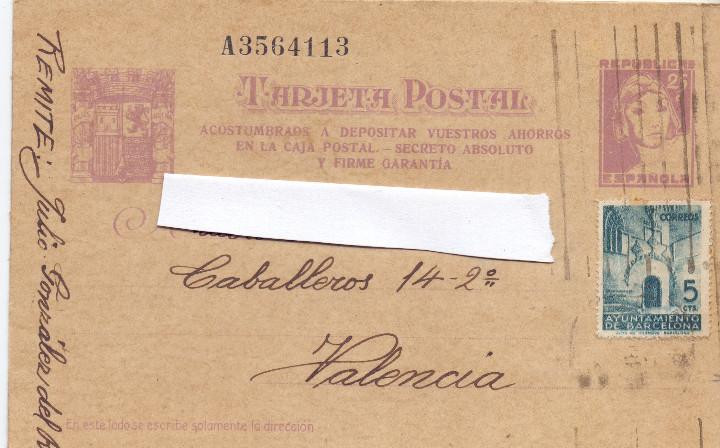

Stationery post card Edifil 79A with Barcelona local Edifil 19, with unreadable postmark but text on the back dated on April 12, 1938. Sent bu Julio González del Río to his brother Arturo in Valencia. Sender’s name on the front, with no references to labor camp number 1, but in the chronology of other known pieces of mail sent by this prisoner while he was in the camp.
Transcription:
Barcelona, 12-4-38
Queridos todos:
Como me encargásteis no dejo de escribiros periódicamente para que sepáis que me encuentro muy bien, de modo que podéis estar tranquilos.
Mandarme 100 Ptas si os es posible para no quedarme sin dinero en caso de que nos trasladasen de aquí o no pudiésemos escribir.
Anduiza está aquí, Fernando en Segorbe.
Muchos recuerdos a todos los amigos, y para vosotros un abrazo muy fuerte de
Julio.
Translation:
Barcelona, April 12, 1938
Dear all:
As you requested, I continue writting you periodically to let you know I am very well, so you don’t need to worry.
Send me 100 Ptas if you can to avoid running out of money if we are transferred anywhere else or if we could’nt write.
Anduiza is here, Fernando in Segorbe.
Lots of regards to all the friends, and a big hug for you, from
Julio.


Air mail postal stationery Edifil 79n to Valencia, uprated with 45c Edifil 737 and Barcelona local Edifil 17, sent by Julio González del Río, in Palacio de las Misiones (Exposición), Barcelona. Postmark of May 25, 1938 and text on the back dated on May 9, 1938. According to Francesc Badia’s study “Els camps de treball a catalunya durant la guerra civil (1936-1939)”, Labor Camp number 1 was “a penitentiary structure composed by the installations of Montjuic’s Poble Espanyol [built for Barcelona’s 1929 World Exhibit], the former diocesan seminar and, during some time, the so called Palacio de las Misiones”.
Transcription:
Barcelona – 9-V-38
Queridos todos: Recibí vuestra carta del día 15 y me extraña no hayáis tenido noticias mías, pues os escribí cada 3 o 4 días.
Yo estoy muy bien de salud, y en cuanto a la comida estoy bien, pues además del rancho, Adelaida y la tía de Marieta (que me lava la ropa) me atienden muy bien. Estoy trabajando en las oficinas muy a gusto.
Cuidaros todos mucho y no os preocupéis de mi.
Muchos abrazos a todos, especialmente para los viejos, de Julio.
Translation:
Barcelona, May 9, 1938
Dear all: I received your letter from past 15 and I am surprised you didn’t get notices from me, as I wrote you every 3 or 4 days.
My health is very well, and food is also well, because extra to the food, Adelaida and Marieta’s aunt (who washes my clothes) give me very good attentions. I am comfortably working in the office.
Take care and don’t worry for me.
Lots of hugs to all, specially to the elders, from Julio.


Postal stationery Edifil 78n with Barcelona local Edifil 17 to Valencia, sent by Julio González del Río, in Palacio de las Misiones (Exposición), Barcelona. Postmark of May 16, 1938.
Transcription:
Barcelona – 15-V-38
Queridos todos: recibí vuestra carta y me alegro que todos estéis bien. Yo estoy muy bien y me atienden todos estupendamente.
Tengo ganas de estar ya con vosotros y los chicos y poder trabajar con tranquilidad.
Está Anduiza conmigo, que vino en una expedición posterior.
Muchoos abrazos a todos y uno muy fuerte para los viejos de vuestro, fin.
Julio
Translation:
Barcelona, May 15, 1938
Dear all: I’ve received your letter and I am happy to learn you all are well. I am very well and I receive excellent attentions by all.
I want to be with you and the boys and to work calmly.
Anduiza is with me, he came with a posterior expedition.
Hugues to all and a big one for the eldery. The end. Yours,
Julio


Postal stationery Edifil 78n with Barcelona local Edifil 17 to Valencia, sent by Julio González del Río, in Palacio de las Misiones (Exposición), Barcelona. Postmark of May 16, 1938. On the back, mark “Maximo 30 Palabras / en la contestacion”.
Transcription:
Barcelona 20-5-38
Queridos todos: No tengo noticias vuestras desde hace más de 20 días y aunque me dicen que estáis bien, quisiera una letra vuestra diciéndolo.
Sigo como siempre estupendamente de salud. Comemos muy bien y nos dan pan a la comida Adelaida y de vez en cuando la tía de Marieta, no tenéis que preocuparos en esta cuestión. De constipados, catarros y todo eso ni hablar, de modo que creo que la viejina puede estar tranquila.
Muchos abrazos a todos, especialmente para los viejos, de Julio.
Translation:
Barcelona, May 20, 1938
Dear all: I’ve had no news from you for the last 20 days, and despite I’ve learned you are all right, I would like a letter from you saying this.
I am in good health as always. We eat very well and Adelaida and sometimes Marieta’s aunt give us bread for the lunch, so you don’t need to worry for this. I’ve not had colds at all, so I think the granny can be relaxed.
Lots of hugs to all, specially for the elder, from Julio.

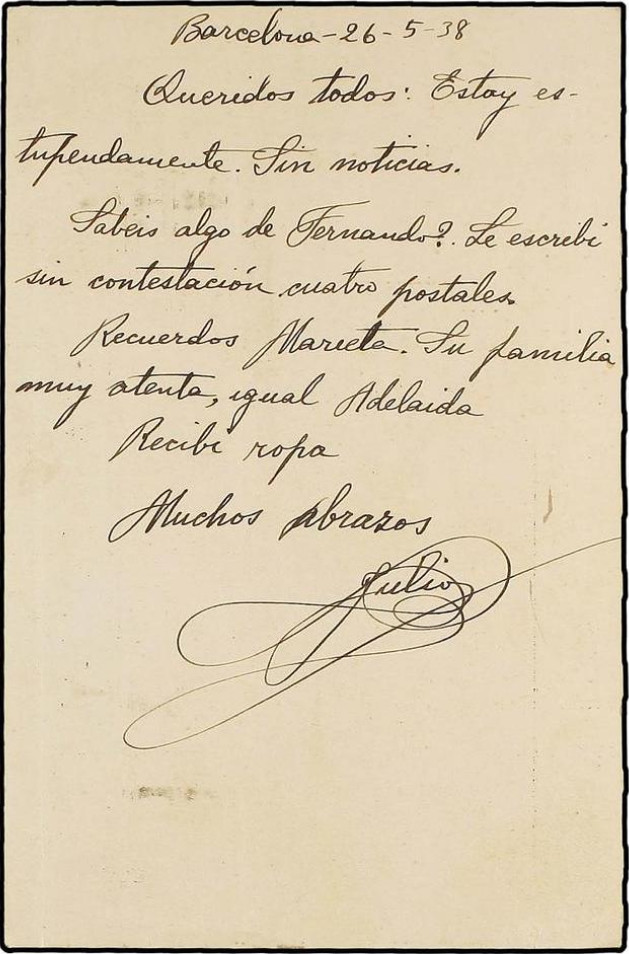
Post card franked with 25c Edifil 685 and Barcelona local Edifil 17. Unreadable postmark, but text on the back dated on May 25, 1938. Sender’s info on the front: “Remite: Julio González del Río, Palacio Misiones (Exposición), Barcelona”. Mark “Máximo 30 Palabras / en la contestación”. Written in a more telegraphic style, so apparently word limit restrictions were imposed.
Transcription:
Barcelona, 26-5-38
Queridos todos: Estoy estupendamente. Sin noticias.
Sabéis algo de Fernando? Le escribí sin contestación cuatro postales.
Recuerdos Marieta. Su familia muy atenta, igual Adelaida.
Recibí ropa.
Muchos abrazos,
Julio
Translation:
Barcelona, May 26, 1938
Dear all: I am very well. No news.
Do you know anything about Fernando? I wrote him four postcards but I got no reply.
Regards Marieta. Her family very attentive, Adelaida the same.
I received clothes.
Lots of hugs,
Julio
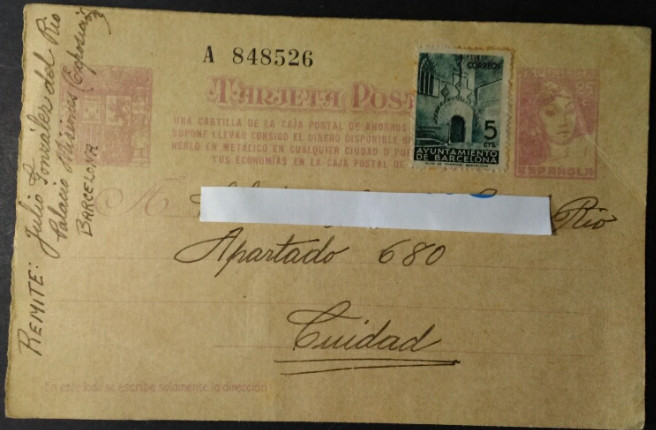

Stationery post card Edifil 78 with Barcelona local Edifil 17. No postmark and no date on the text. Sender’s info on the front: “Remite. Julio González del Río, Palacio Misiones (Exposición), Barcelona”. Telegraphic style as word limit restrictions may had been set for the prisoners mail.
Transcription:
Mandarme: jabón de tocador, un tubo de pasta de dientes, un mono azul oscuro u otro color sufrido para mecánico, dos pares de alpargatas de suela de goma del 44, una toalla y un poco de tintura de yodo.
Julio.
D Arturo me hace mucho favor mandarme sellos urgentes, aquí no se encuentran hace días.
Translation:
Send me: soap, toothpaste, blue coveralls or another appropriated color for mechanic work, espardilles with rubber sole nr 44, a towel and some iodine tincture.
Julio.
D. Arturo, it is very useful for me to send me express mail stamps, they can’t be found here since a lot of days ago.
LABOR CAMP NUMBER 2


Improvised post card with unreadable roller postmark, but text on the back dated on May 11, 1938. Sender’s info on the front: “Josep Blasi Mora, Camp Treball nº 2, 1ª Companyia, Hospitalet de Mar (Tarragona).
Transcription:
Hospitalet de Mar, 11 maig 1938
Estimats pares,
Com que no he rebut contestació a cap carta, torno a escriure. Espero tindre més sort.
Necessito rebre lo més aviat posible lo següent: uns pantalons, unes espardenyes, 2 parells de mitjons sport, 2 mudes interiors, una camisa tela forta, savó i algunes pessetes /300/ (tinc un deute encara de Montjuich). Necessito també unes quantes postals. Si creieu que podeu enviar-me alguna cosa que pugui ser-me d’utilitat, envieu-me-la (tabac, etc). No se el procediment per rebre això, a molts els hi porten la mateixa família, els diners es poden enviar per gir.
Estic bé, espero que vosaltres també. Procureu almenys escriurem. Crec que escriure no és molt difícil.
Ja escriuré una altra vegada dintre uns tres dies. Molts petons per la mama i per a tots.
Josep Blasi
Translation:
Hospitalet de Mar, may 11, 1938
Dear parents,
As I’ve got no answer to any of my letters, I write to you again. I hope I’ll be more lucky this time.
I need to receive as soon as possible the following: trousers, a pair of shoes, two pairs of sport socks, two underpants, a shirt of srtong clothing, soap and some money, 300 pts (I still have a debt from when I was in Montjuïc). I also need some post cards. If you think you can send me anything useful, do et (tobacco, etc). I don’t know how to receive this, many get goods from their families, that bring them here. The money can be sent through a money order.
I am all right. I hope you too. Remember, at least, to write to me. I think writting is not very difficult.
In some three days I will write to yo uagain. Lots of kisses for mom and for all.
Josep Blasi


Stationery post card Edifil 77n with no postmarks, but text on the back dated on May 22, 1938. Sender’s info on the back: “C.T. Nº 2, 1ª Comp., 2a Secc., 4t Pelotó, 1ª Escuadra”.
Transcription:
Hospitalet de Mar, 22 Maig 1938
Estimats pares,
Torno a escriure per a demanar-vos algunes coses que necessito i que l’última vegada vaig deixar de demanar-vos. Estic bé, encara que per así i fa aquests dies molt vent i força fret.
Si podeu enviar-me lo que segeix ho podeu fer de la manera més convenient, ràpida i segura: un citurón, ja que he perdut el que tenia, un parell de corretgetes per a les manes, una fiambrera (la petita), savó, agulla i fil fort (negre i blanc), la motxila, un bloc paper cuadriculat, postals, una dotzena llbrets paper fumar, unes cuantes pedres encenedor, unes altres espardenyes, ja que las que vaig rebre resulten petites d’ún número i ja són foradades. De menjar, si podeu enviar lo següent, podeu fer-ho sempre que sigui un incovenient per a vosaltres: oli, puré o tapioca, uns cubets Maggi, unes cabeçes d’alls, sal. Os demano això perquè s’hem reprodueix el mal d’estómac i tinc por que proguressi. Lo que m’interessa moltíssim és el tabac, en canvi les pessetes no en necesito.
En Farreró diu si teniu res per a ell
No escric més sovint per falta de postals.
Penso molt amb vosaltres i suposo que estareu bé. Petons per a tots.
Vostre,
Josep Blasi Mora
C.T. nº 2
1a Comp. 2ª Secc. 4at Pelotó, 1ª Escuadra
Translation:
Hospitalet de Mar, May 22, 1938
Dear parents,
I write again to ask you some goods I need and that I didn’t ask for last time. I am all right, despite these days it is very windy and cold here.
If you can, send me what I will mention below in the most convenient, fast and safe way: a belt, as I’ve lost the one I had, two straps for the blankets, a lunch box (the small one), soap, a seewing needle and strong thread (black and white), the bag, a block of squared paper, post cards, a dozen packs of cigarette paper, some lighter stons, another pair of shoes, as those what I received were small and are already holed. If you can and if it is not an inconvenient for you, send the following food: olive oil, mashed potato or tapioca, Maggi soap cubes, garlic, salt. I ask all this because my stomack ache came back and I fera it increases. Tobacco is what most interests me, but I don’t need any money.
Farreró asks if you have anything for him.
I don’t write more often because I don’t have post cards.
I think a lot about you and I guess you are all right. Kisses for all.
Yours,
Josep Blasi Mora
C.T. nº 2
1a Comp. 2ª Secc. 4at Pelotó, 1ª Escuadra
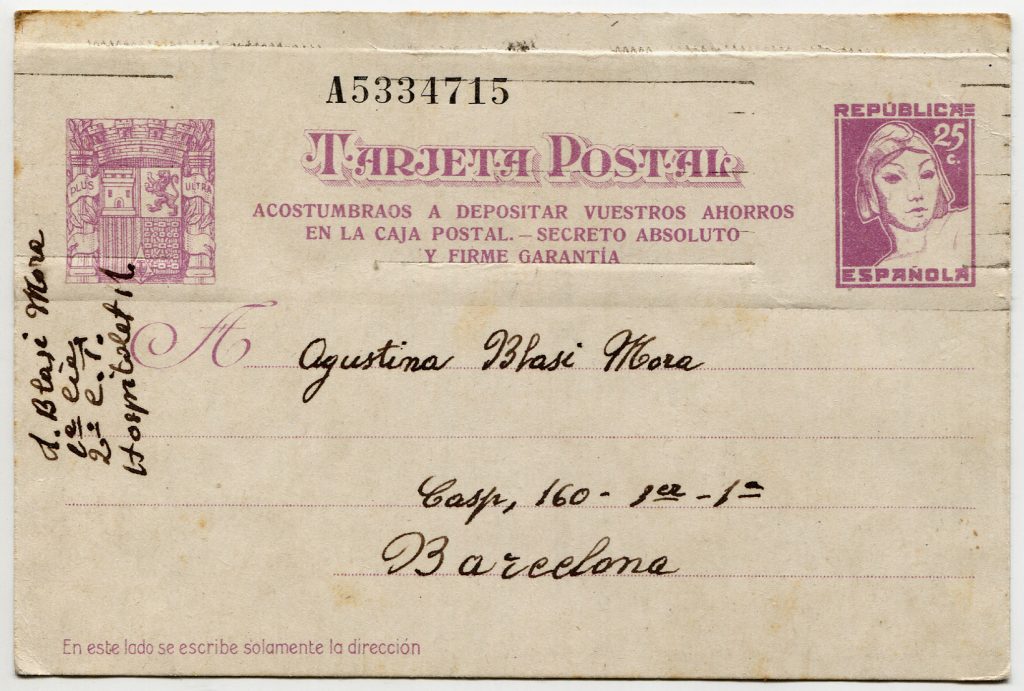
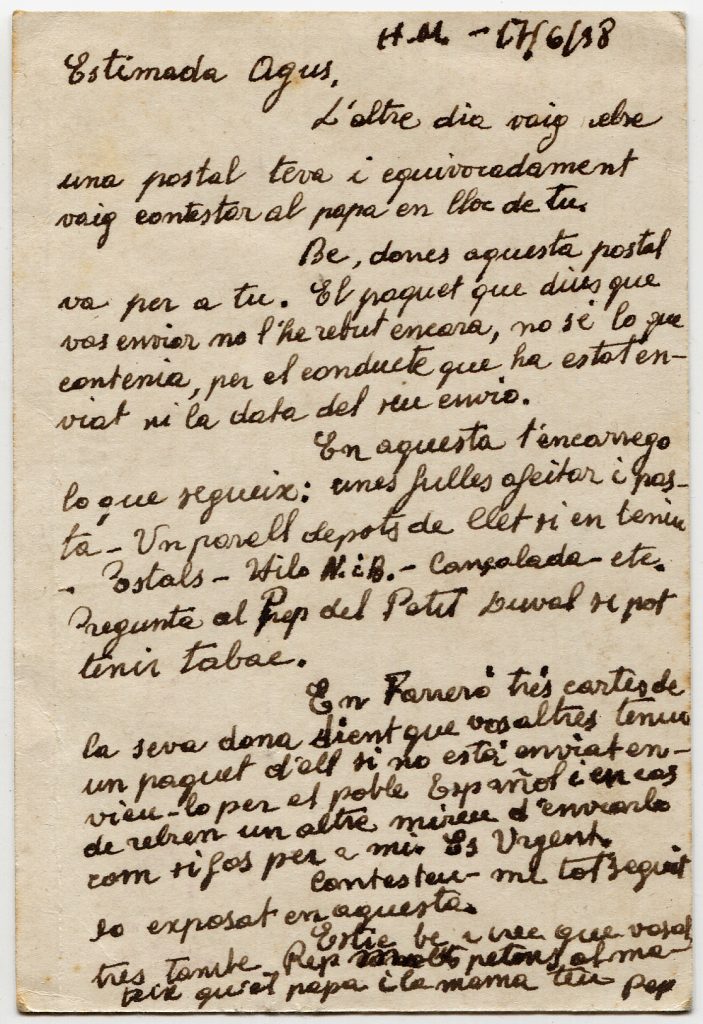
Stationery post card Edifil 79n with unreadable roller postmark but text on the back dated on June 17, 1938. Sender’s info on the front: ‘J. Blasi Mora, 1ª Cia., 2º C.T., Hospitalet M.
Transcription:
H.M. – 17/6/38
Estimada Agus,
L’altre dia vaig rebre una postal teva i equivocadament vaig contestar al papa en lloc de tu.
Bé, doncs aquesta postal va per a tu. El paquet que tius que vas enviar no l’he rebut encara, no se lo que contenia, per el conducte que ha estat enviat ni la data del seu envio.
En aquesta t’encarrego lo que segueix: unes fulles d’afeitar i pasta, un parell de pots de llet si en teniu, postals, fils N[egre] i B[lanc], cançalada, etc. Pregunta al Pep del Petit Luval si pot tenir tabac.
En Farreró tres cartes de la seva dona dient que vosaltres teniu un paquet d’ell. Si no està enviat, envieu-lo per el Poble Español, i en cas de rebren un altre mireu d’enviarlo com si fos per a mi. És urgent.
Contesteu-me tot seguit lo exposat en aquesta.
Estic bé i crec que vosaltres també. Rep molts petons, al mateix que el papa i la mama. Teu, Pep.
Translation:
H.M. (for Hospitalet de Mar), June 17, 1938
Dear Agus,
The other day I received a post card from you and I wrongly replied to dad instead to you. Well, this post card is for you. I’ve not received yet the packet you say you sent to me. I don’t know what did content, nether through which channel has it been shipped, nor when was it shipped.
With this post card I ask you the following: shaving razors and soap, a couple of milk cans if you have, post cards, sewing thread N and B (for Black and White), bacon, etc. Ask Pep del Petit Luval if he could have tobacco.
Farreró has three letters from his wife saying you have a packet for him. If it has not been shipped it, send it through Poble Espanyol, and if you get another one try to send it as if it was for me. It is urgent.
Reply to me as soon as possible.
I am fine and I think you too. Lots of kissas, and also for dad and mom. Yours, Pep.


Stationery post card Edifil 79 with no postmarks, but text on the back dated on June 21, 1938. Sender’s info on the front: José Blasi Mora, Campo nº 2, 1ª Cía., Hospitalet de Mar.
Transcription:
Hospitalet, 21/6/38
Querido padre,
Ayer recibí dos paquetes que, como de costumber, no contenían la lista de lo que había. Me estraña mucho que a pesar de mis insistentes ruegos no me la mandéis nunca o casi nunca. Hazme el favor de mandarme una a vuelta de correo.
No se si recibisteis una postal mía en la que pedía algunas cosas, como hilo blanco y negro, un encendedor de mecha con un metro de mecha, cebollas, ajos, aspirina, Fonicao, tortilla en polvos, tocino, etc, etc. Necesitaría aceite, pero no se si se puede mandar: os enteráis y en caso afirmativo me lo mandáis.
Siempre que me mandéis algo lo entregáis al Pueblo Español, pero no el miércoles, sino el otro día que en este momento no se cuál es.
Estoy bien y espero que dentro poco tiempo saldré para Barcelona, ya que salen muchos.
Nada más, sólo muchos besos, Pep
Translation:
Hospitalet, June 21, 1938
Dear father,
Yesterday I received two packets and, as usual, they didn’t have the content list. I find it very rare that despite continuously asking for the content list it is never or almost never in the packet. Please, send me one through mail.
I don’t know if you received a post card from me asking several things, like white and black sewing thread, a fuse lighet, a meter of fuse, onions, garlic, aspirine, Fonicao (powder of cocoa) powder omelette, pork, etc, etc. I would need olive oil, but I don’t know if it will be admitted: see if it is possible and if it is, send me some.
Always deliver what you ship me in Pueblo Español, but not on Wednesday, but the other day I can’t remember now what is it.
I am fine, I hope if a few time I will go to Barcelona, as many go there.
Nothing else, just lots of kisses, Pep


Stationery post card Edifil 79, with International Brigades postmark Herller 62, “CORREO DE CAMPAÑA /B.I./ E. DE C. Nº 4” with date June 28, 1938, and International Brigades censor mark Heller 66 on the back, reading “E.C. Nº4 B.I. / CENSURA MILITAR” in red. Sender’s info on the front: “José Blasi Mora, 1º Cia., 2ª Secc. Hospitalet M.”.
Transcription:
21/06/38
Querido padre,
No se si os dije en mi anterior que el último lunes recibí dos paquetes, pero como de costumbre, sin lista. No se qué os pasa, porque hace muchos días que no he recibido ninguna carta vuestra. Procurad escribirme amenudo.
También os dije que los días que recibían los paquetes en el Pueblo Español eran miércoles y sábado. Pues no; es viernes y sábado. Preguntad al Pueblo Español lo que me podéis mandar, no me mandéis nada sin antes preguntarlo a ellos. Mandadme un cuchillo plegable, uno do dos botes leche y otras conservas, queso y un poco de jabón, el termo pequeño y lo que podáis, siempre que lo permitan. Da muchos besos a la Mercè y a la Agus, y des de luego a ti.
Tuyo, Pep.
Translation:
June 21, 1938
Dear father,
I don’t know if I told you on my previous card that past Monday I received two packets but, as usual, without a list. I don’t know how are you, because I don’t get any letters from you since a long time. Try to write to me often.
I also told you that the days you could bring the packets in Pueblo Español were on Wednesday and on Saturday. Well, no; it is on Friday and on Saturday. Ask in Pueblo Español what you can send me, do not send anything without first asking them. Send me a folding knife, one or two cans of milk and other preserved food, cheese and some soap, the small thermos and whatever you can, as long as it is allowed. Give lots of kisses to Mercè and to Agus, and of course for you too.
Yours, Pep


Stationery post card Edifil 79 with International Brigades post mark Heller 62 “CORREO DE CAMPAÑA /B.I. / E. DE C. Nº 4” dated on June 30, 1938. On the back , International Brigades censor mark Heller 66 reading “E.C. Nº 4 B.I. / CENSURA MILITAR” and International Brigades also transit postmark Heller 85 “CORREO DE CAMPAÑA / B.I. / E. DE C. B. MOVIL” of July 1, 1938. Sender’s info on the front: “José Blasi. C.T. nº 2, 1ª Cia, Hospitalet M. [censored], Turia 3”.
Transcription:
Estimada Agus,
Acabo de rebre la teva carta 22/6. Bé doncs, els paquets els teniu d’enviar el desapte i els rebo al dilluns. Vaig rebre un paquet de tabac Ingles i un de 0’50 Ptes espanyol; de paper de fumar segurament deixareu de posar-li.
Parles de portar-me, millor dit, d’enviar-me patates. Avans d’enviarne pregunteu al Poble Espanyol si es pot enviar. El termos ha de ser petit. El pot de conill arrivar desoldat o millor dit overt per la tapa. De totes maneres era bo. Aproximadament cada 15 dies necesitaria unes espardenyes. La granota, si és que la teniu, me la podríeu enviar, ja que la que tinc està bastant deteriorada. Si no demano roba no n’envieu. Necesitaria una fiambrera un bon tros més gran que la que tinc. Digues sempre per carta si rebs les meves i enviam llista com en aquella.
Bé, res més per avui, sols molts petons per a tots del teu germà,
Pitus
28/06/38
Translation:
Dear Agus,
I’ve just received your letter from June 22. Well, you must send the packets on Saturday and I get them on Monday. I received a packet of English tobacco and another one, Spanish, of 0.50 pts; I guess you forgot to add smoking papers.
You talk about bringing me, well, better said, to send me potatoes. Before sending them ask in Poble Espanyol if they are allowed. The thermos must be small. The rabbit can arrived unsealed, o better said, opened. Despite of this it was good. You could send me the coveralls if you have any, as the one I use is very worn. If I don’t ask for clothes, dont’ send any. I would need a bigger lunch box than the one I have. Tell me always through a letter if you get mine, and send me a list like you did in the other one.
Well, nothing more to tell, just lots of kisses for you all from your brother,
Pitus
June 28, 1938


Stationery post card Edifil 77n with no postmarks, but text on the back dated on July 2, 1938. Sender’s info on the front: Josep Blasi Mora, Camp Treball 2, 1ª Cia.
Transcription:
2/7/38
Estimada Agus,
Avui he rebut la teva postal 25/7 i també una carta d’en Farreró. Avui he rebut una capsa de cartró contenint un barret i prou; de totes formes encara falten repartir alguns paquets. Si veus a en Farreró pregunta-li lo del tabac. Si podeu envieume fruita i tomates, però ben acondicionats. Si teniu faba mòlta torneu-la a enviar. Acabo d’escriure a la Sones. Fes molts petons a tots i tu rep una forta abraçada a part dels petons, del teu germà, Pitus.
Translation:
July 2, 1938
Dear Agus,
Today I’ve received your post card of July 25 [this is obviously a mistake, he may refer to June 25] and also a letter from Farreró. Today I’ve received a cardboard box containing only a hat and nothing else; by the way, there are still some packets to be delivered. If you see Farreró ask him about the tobacco. If you can send me fruit and tomatoes, but well packed. If you have grind beans send some again. I’ve just written to Sones. Give lots of kisses to all and a big hug for you with the kisses, from your brother, Pitus.


Stationery post card Edifil 77n with no postmark, but text dated on July 5, 1938. Sender’s info on the front: José Blasi Mora, Campo Trabajo nº 2, 1ª Cía., Base Turia nº 3.
Transcription:
5/7/38
Querida hermana (a) Agus,
No te estrañe que no te escriba en idioma catalán ya que si lo hago es por cuestión de la censura. En una postal anterior me anunciabas una carta que aun no he recibido.
Lo de los paquetes ya os he dicho en anteriores que solo se puede mandar comidacocida, conservas, embutidos, leche, chocolate, tocino, etc, pero no cebollas, Maggi, ajos, aceite, purés, etc. El tabaco estas dos veces lo he recibido bien, asi es que de ahora en adelante lo puedes mandar sin reparo. Esperaba el paquete de Juan y deMaría. Lo del mono si lo tienes mandádmelo. Pensad en alpargatas.
Da muchos abrazos a todos y a ti de Pitus.
Translation:
July 5, 1938
Dear sister Agus,
Don’t be surprised I’m not writting you in Catalan because I do this for censorship reasons. In a previous post card you announced me a letter I’ve still have not received.
Referring to the packages, I’ve previously said you only cooked meals can be sent, cans, sausages, milk, chocolate, pork, etc; butnot onions, Maggi, garlic, olive oil, mashed potatoes, etc. The two previous times I’ve received with no problem tobbacco, so from now on you can send it with no worries. I was waiting Juan and Maria’s package. Send an overalls if you have it. Remember about espadrilles.
Lots of hugues to everyone and to you, from Pitus.

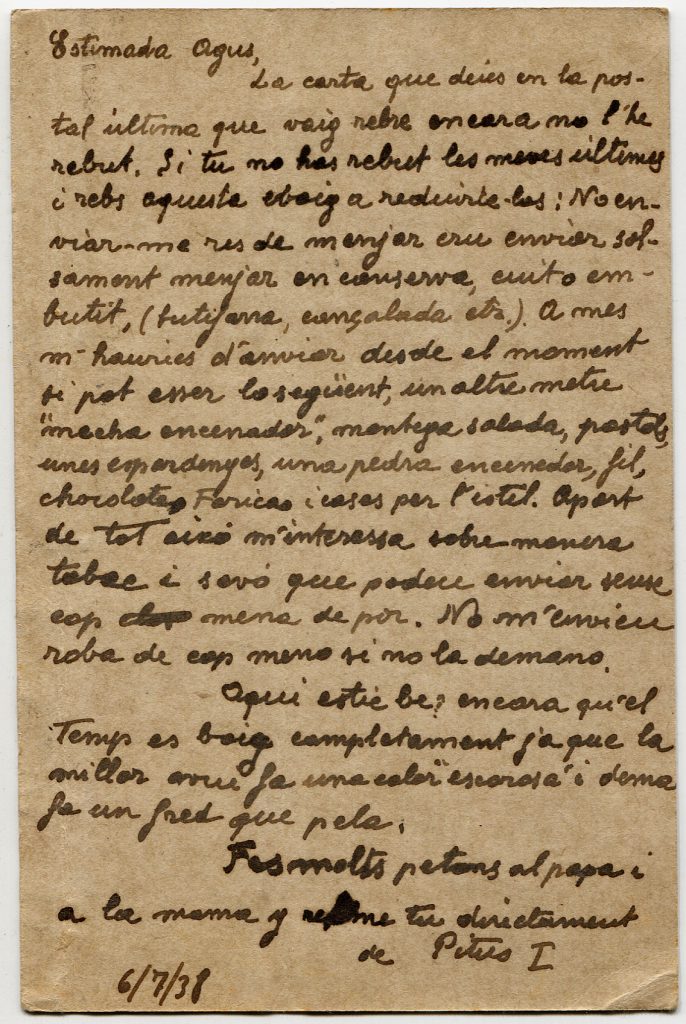
Stationery post card Edifil 77n with unreadable roller postmark. Text on the back dated on July 6, 1936. Sender’s info on the front: Josep Blasi, 2on Camp T., 1ª Cia, Base Túria nº 3.
Transcription:
Estimada Agus,
La carta que dius en la postal última que vaig rebre encara no l’he rebut. Si tu no has rebut les meves últimes i rebs aquesta vaig a resumirte-les: no enviarme res de menjar cru, enviar solsament menjar en conserva, cuit o embutit (butifarra, cançalada, etc). A més, m’hauries d’enviar des de el moment si pot ésser lo següent: un altre metre “mecha enecendor”, mantega salada, postals, unes espardenyes, una pedra encenedor, fil, chocolate Faricas i coses per l’estil. A part de tot això m’interessa sobre manera tabac i savó, que podeu enviar sense cap mena de por. No m’envieu roba de cap mena si no la demano.
Aquí estic bé, encara qu’el temps és boig compltament, ja que la millor avui fa una calor escarosa i demà fa un fred que pela.
Fes molts petons al papa i a la mama y rebne tu directament,
de Pitus
6/7/38
Translation:
Dear Agus,
I’ve not received yet the letter the letter you mention on your last post card. If you haven’t received my post cards and you get this, here is a summary: do not send me any of raw food, only canned or cooked food or cold meat (sausage, bacon, etc). You also should have to send me immediately the following: another meter of fuse for the lighter, salty butter, post cards, a pair of shoes, a lighting stone, thread, Faricas chocolate and things on the like. Also, I am extremely interessed in tobacco and soap, that you can send with no fear. Do not send me clothes if I don’t ask them.
I am all right here, but the weather is completely mad: maybe today is annoyingly hot and tomorrow it’s terribly cold.
Give lots of kisses to dad, mom and for you,
from Pitus
July 6, 1938


Stationery post card Edifil 77n with flawn roller postmark printing, unreadable, but text on the back dated on July 8, 1938. Sender’s info on the front: José Blasi Mora, Campo Trabajo nº 2, 1ª Compañía, Base Turia nº 3.
Transcription:
Estimada Agus,
Encara a hores d’ara no he rebut la carta que deies que m’escrivies. Prent nota de l’adressa meva escrita a l’altre cantó de postal.
Cada setmana t’encarrego a lo millor lo que t’havia encarregat a l’anterior. Per evitar doncs confusions, cada vegada que m’envieu quelcom, envieu-me sempre que pogueu lo següent: llet condensada, cançalada, cacau, alguna conserva, tabac, etc. Lo que demani extraordinàriament és lo que demanaré cada vegada per escrit. Axís que vingui bé, envieu-me: el mono, espardenyes, postals, una camisa tela forta, 3 venes de 25mm, 1 botella yodo, una ida pota bou, cotó i gassa. No envieu mai roba que no demani, m’és un estorb.
No demano res més, sols que envaleu bé els paquets només amb cartró i paper. Molts petons al papa, a la mama, a la Sones i a tu.
Teu, Pitus
8/7/38
Translation:
Dear Agus,
I’ve not received yet the letter you say you sent me. Take good note of my address, on the other side of this post card.
Every week I ask you for things that maybe I already requested on the previous week. To avoid confusions, each time you send me a packet put the following in it, if you can: caned milk, bacon, cocoa, some caned food, tobacco, etc. Each time I will explicitly ask for extra goods I may need. When you can, send me: coveralls, shoes, post cards, a shirt of strong clothing, three 25mm bandages, a bottle of iodo, cotton and gauze. Never send clothers if I don’t ask for them, as they are an impediment.
I don’t ask for anything else, just that yu send the packages well protected with cardboard and paper only. Lots of kisses for dad, mom, Sones and you.
Yours, Pitus
July 8, 1938


Stationery post card Edifil 80n with postmark “CORREO / MILITAR / 18 JUL 1938 / ESTADO MAYOR / MINISTERIO DE DEFENSA”. Text on the back dated on July 18, 1939 (obviously this is a mistake and the year should read 1938, as in the postmark). No sender’s info, but signature. Dates in the chronology the sender spent in Labor Camp nr. 2.
Transcription.
18/7/39
Estimada Agus,
No se si vaig escriuret dient que vaig rebre una postal de la Tresina, el cas és doncs que diu que contesti, i no se l’adressa que té.
Vaig escriure’t perquè m’enviessiu una camisa forta, uns pantalons o un mono, una cantimplora, uns trossos de corretja cuiro d’uns 10 a 25 mm ample per unes sandàlies, etc.
Aquí fa molta calor però estic bé. Fes molts petons a tots, i a tu per descomptat,
Pep
Translation:
July 18, 1939
Dear Agus,
I don’t remember if I wrote you saying I got a post card from Tresina. She wants me to reply, but I don’t know her address.
I wrote you asking for a shirt with strong clothing, a pair of trousers, a coverall, a canteen, some pieces of strap of a width of 10 to 25mm for the sandals, etc.
It is very hot here, but I am fine. Lots of kisses for all and for you, of course,
Pep


Stationery post card Edifil 78n with mute postmark and International Brigades censor mark Heller 5a. Text on the back dated on July 23, 1938. No sender’s info, but signature. Dates in the chronology the sender spent in Labor Camp nr. 2. Only two other cards known with International Brigades marks circulated form a labor camp.
Estimada Agus, avui he rebut al mateix temps la carta i la postal 14/7. Espero rebre tot lo demanat: cantimplora, mono, espardenyes, noveles, barret, més cotó, benes, yodo i oxigenada, etc. El paquet de Lucky l’he rebut, els pots dellet també.Pensa a donarme l’adressa de la Sones per escriure-li. Aquí hi fa una caló pitjor que a la “infernal Mancha” segons en Sandoval, i les mosques mil vegades mes numeroses que a Artesa. Fes molts petons a la mama i al papa i a la Ne. Ja tornaré a escriuret al dilluns pròxim. Reb una forta abraçada.
Pitus
23/7/38
Translation:
Dear Agus, today I’ve received the letter and the post card you sent on July 14, at a same time. I hope to receive all what I’ve requested: canteen, overalls, espadrilles, novels, hat, more cotton, bandages, iodo & hydrogen peroxide, etc. I’ve got the Lucky cigarettes, and also milk cans.Remember to tell me Sones’ address to write to her. Here is a hot worst than in ‘infernal Mancha’ according to Sandoval, and flyes area thousand times more numerous than in Artesa. Give lots of kisses to dad, to mom and to Ne. Next Monday I’ll write to you again. Hugue hug,
Pitus.
July 23, 1938


Stationery post card Edifil 78n with unreadable roller postmark and text on the front dated on August 13, 1938. Sender’s info on the back: Campo de Trabajo nº 2, 1ª Cía., 1ª Sección, Base Turia 3. We don’t have further references about the sender, as he only signs the text with his first name, Santiago.
Transcription:
Hoy, 13 de agosto de 1938
Queridos todos:
Ayer recibí la tarjeta del Tomaset, muchas gracias y espero la carta de Tomás. Como sea que debido a las lluvias y demás tengo la maleta hecha un desastre, haríais el favor en caso de poder, de mandarme una que fuera de la siguiente medida aproximadamente, 60×40, y si tubiera algún trozo de género pluma color oscuro, que Pilar o Montserrat me hicieran una funda. Enseguida que reciba el paquete os acusaré recibo. Yo sigo bien y espero que vosotros estaréis igual.
Nunca os olvida,
Santiago
Mi dirección:
Campo de Trabajo nº 2
1ª Cía, 1ª Sección
Base Turia 3
Translation:
Today, August 13, 1938
Dear all:
Yesterday I received Tomaset’s post card, thank-you and I am awaiting for Tomàs’ letter. Due to the heavi rains my suitcase has turned into a disaster. If you can, please send me another one with approximate sixe of 60x40cm, and if you have dark clothing, Pilar or Montserrat could make a cover for it. As soon as I will receive the packet I will notice you. I am still well and I hope you are also.
Never forgets you,
Santiago
My address:
Labor Camp number 2
1st Company, 1st Section
Base Turia 3


Stationery post card Edifil 77n. Unreadablel roller postmarkd and text on the back dated on August 20, 1938. Sender’s info on the front: José Blasi, 2º Campo Trabajo, 1ª Compañía, Base Turia nº 3.
Transcription:
20-8-38
Estimada Agus,
Fa dos dies que vaig rebre la teva carta 10-8. Els dos paquets de tabac els vaig rebre bé tres dies després d’enviarlos vosaltres. Sempre que pogueu enviarne, envieu-los per correu sense res més, com aquesta última vegada. Vaig deixar de rebre un paquet que segurametn serà aquest que tu parles. Per el Poble Español envieume solsament coses com pa, roba, etc, però conserves, llet, carn en conserva, lo millor és enviar-ho també per correu. El paquet qu’he rebut aquesta semana contenia cançalada, 1/2 pa, 1 pot carn, metxa, un tarròs sucre rus, avellanes, un tub dents, dos pedres encenedor. Fins avui no sabia qui era en Josep, el confonia amb el noi aquell. Junt amb la teva carta n’he rebut una de la Maria que m’esplica lo que tu dus, fer el burro. Fes molts petons a tots. Pitus.
Translation:
August 20, 1938
Dear Agus,
Two days ago I received your letter from August 10. I received two packets of cigarettes three days after you shipped them. Whenever you can, send them through the mail with nothing else in the package, like this last time. I didn’t receive a package that may be the one you talk about. Only send megoods like bread, clothes, etc, through Poble Español, but cans, milk, canned meat, better send that through the mail. The package I’ve got this week had bacon, half bread, a can of meat, a wick, a Russian sugar cube, hazelnuts, teeth paste, two lighter stones. Up to day I didn’t know who Josep was, I was confused with that other guy. Alongside with your letter I’ve got one from Maria explaining what you say, making nonsenses. Give lots of kisses to everyone. Pitus.


Stationery post card Edifil 77n with unreadable roller postmark and with Santa Coloma de Farners arrival postmark, dated on August 29, 1938. Text on the back dated on August 22, 1938. Sender’s info on the front: Josep Blasi Mora, 2on Camp Treball, 1ª Companyia, Base Túria nº 3.
Transcription:
Estimada Teresina,
Acabo de rebre la teva postal. Ja faria la lletra més petita i els espais més junts, però no pot ser. De totes maneras, et diré que faig anar el pic i la pala. Que’l mal que tenia al peu ja està curat. Que encara falte donarme la tercera injecció de la vacuna. Que precisament ara vaig amb una botalleta per a nonar-nos l’injecció última. Que aquest és un país molt asquerós i que tinc moltes ganes d’anar a casa, i moltes altres coses. Ja sabia que estaves amb la Conxita, axís com també el Colom. Ja procuraré escriure sovint, i tu o la Conxita feu lo mateix. Molts petons tu i Conxita, Colom, Cosme, nens, etc.
Vostre,
Pep
22-8-38
Translation:
Dear Teresina,
I’ve just received your post card. I would make a smaller letter and narrower slanting, but it is not possible. By the way, I can say you that I use peak and shovel. That the injury I had on my foot is already healed. That I still miss the third injection of the vaccine. That just now I carry the vaccine and they a going to put us the last injection. That this is a very awful county and that I want to go home, and lots of things more. I already knew you were with Conxita, and with Colom. I’ll try to write to you often, and you and Conxita do the same. Lots of kisses to you, Conxita, Colom, Cosme, the children, etc.
Yours,
Pep
August 22, 1938


Stationery post card Edifil 79A, with Barcelona roller postmark dated on September 4, 1938 and text on the back dated on August 31, 1938. No sender’s info, but signature. Dates in the chronology the sender spent in Labor Camp nr. 2.
Transcription:
31-8-38
Estimada Agus,
Ahir vaig rebre la carta teva 24-8. Ja sabia que’l teu St. era aquest mes, però no sabia el dia exacte. Va el regal: fa dies vaig enviarte unes postals que demanava una boina i unes espardenyes. Enviame-las, las necesito urgenment. Vaig rebre el paquet el dilluns amb un troç de cansalada, 1/2 pa, avellanes, 2 venes, axigenada, cotó, fil i agulles. Fa una semana vaig rebre 1 paquetilla, dilluns 4 paquetilles, un paquet anglès i 6 llibre Payà, i ahir una paquetilla per correu. He rebut el toldo. Enviam junt amb la boina sacarina i per correu, precisament sense demora. Molts petots per a tots,
Pitus
Translation:
August 31, 1938
Dear Agus,
Yesterday I receive your letter fom August 24. I already knew your name day was in this month, but I didn’t know which day. Here is my gift: some days ago I sent you some post cards asking for a beret and a pair of shoes. Send this to me, I urgently need it. On Monday I received the packet with a peace of bacon, half bread, hazelnuts, 2 veins, perodixe, cotton, sweewing needle and thread. A week ago I received one tobacco packet, on Monday four packets, an English tobacco packet and six packs of cigarette paper. I’ve received the awning. Send sacarine with the beret through the mail, with no delay. Lots of kisses for all,
Pitus

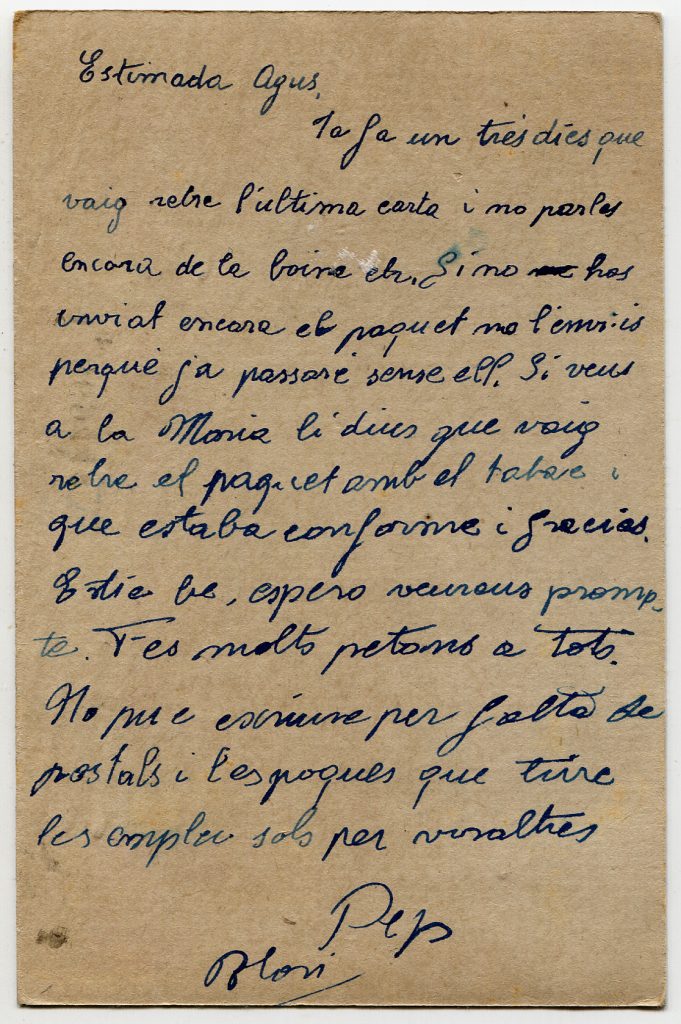
Stationery post card Edifil 78, with Barcelona roller postmark dated on September 9, 1938. Text on the back without date. No sender’s info, but signature. Dates in the chronology the sender spent in Labor Camp nr. 2.
Transcription:
Estimada Agus,
Ja fa un tres dies que vaig rebre l’última carta i no parles encara de la boina, etc. Si no has enviat encara el paquet, no l’enviïs, perquè ja passaré sense ell. Si veus a la Maria li dius que vaig rebre el paquet amb el tabac i que estaba conforme, i gràcias.
Estic bé, espero veureus prompte. Fes molts petons a tots. No puc escriure per falta de postals, i les poques que tinc les omplu sols per vosaltres,
Pep Blasi
Translation:
Dear Agus,
Some three days ago I received your last letter, and you don’t say anything there about the beret. If you have not shipped the packet yet, don’t do it, I can stay without it. If you see Maria tell her I got her packet with tobacco and that it was all OK, and thanks.
I am fine, I hope to see you soon. Give lots of kisses to all. I can’t write as I lack post cards, and I use the few I still have to write to you,
Pep Blasi

Cover from labor camp number 2 to the International Committee of the Red Cross in Barcelona, with mark of the camp used as franchise. The mark reads “MINISTERIO DE DEFENSA NACIONAL * S.I.M. * / CAMPO DE TRABAJO / Nº 2”. Field post postmark dated on Oct 31, 1938.
LABOR CAMP NUMBER 2, DETACHMENT IN TIVISSA
Group of post cards sent by prisoner Juan Jorba Reventós. He was liberated on late October 1938 and he enrolled a Republican military unit. We don’t know if he survived the war.


Improvised post card made of a notebook page. Unreadable roller postmark, but text dated on May 29, 1938
Transcription:
Diumenge 29-5-38
Estimada mare, germa i avia: salut com yo disfruto, os desitxo per tots.
Ahi i avui os esparam el paquet, ens a fet molt estrany de que no hagia vingut, suposo que ya vara rebra la postal que dic que estem sols amb el Josep de Can Pau, estem més lluny de Hospitalet, al campament de la 2ª companyia. Porteunos oli i sal i tabacs.
Per mi estigeu tranquils, os o prego, que yo i el Josep estem juts i molt bé.
Res mes, el vostre Juan que molt os estima,
Joan Jorba
P.D. cuant porteu paquet poseui la direcció 1ª Secció 2ª Companyia
Translation:
Sunday, May 29, 1938
Dear mother, brother and grandmother: I hope you are in good health like I am, this is my wish for you all.
Yesterday and today we were awaiting for the packet, we find it very rare it has not arrived, I guess you received the post card where I was saying we are alone with Josep from Can Pau, we are far from Hospitalet, in the camp of the 2nd company. Bring us olive oil, slat and tobbacco.
Do not worry for me, I beg you, as Josep and I are together and very well.
Nothing more to add, your Juan who loves you,
Joan Jorba
PS: When you send the packet write on the address 1st Section, 2nd Company.


Stationery post card Edifil 79n with no references pointing to the origin in the SIM’s labor camp number 2, but in the chronology of the sender while he was interned, known thanks to other cards sent by the same prisoner. No postmark, bu text on the back dated on June 5, 1938.
Transcription:
Molt estimat germa: Desitxaria que en rebra aquestas ratllas os trobesiu be de salut com yo.
Joaquim, voldria que tinguesis la molestia de escriurem cuatra ratllas per esplicarme forsa cosas que pasan per aqui a Collbató, esplicam com ban les anyadas de sembrat del ordi, si ya el segeu, i com marchan las vinyas. Digam si has plantat las tabaqueras, dons me agradaria molt que mu escrigesis per que encara no e rebut cap carta vostra. No me envieu cap peseta dons aqui es el que sobra, contes usales en tabaco. Res mes, una abrasada per la mara i la avia i tu, del teu germa Juan Jorba, 5-6-38.
Translation:
Dearest brother: I wish you have good health, like me, when you receive this text.
Joaquim, I would like you to write me explaining what’s going on in Collbató. Tell me how the barley grows, if you have started the harvest, how the vineyards are. Tell me if you have planted tobbacco. I would love you could write to me, as I’ve not received any letter from you yet. Do not send money, it is useless here, but send tobbacco instead. No more to tell, hugs for mom, for the granny and for you, from your brother Juan Jorba, June 6, 1938.


Stationery post card Edifil 79M with unreadable roller postmark, but text on the back dated on June 15, 1938. Despite no mention to labor camp number 2 anywhere, chronology shows this cart was written from the camp. Also, the sender requests to receive packets throug Poble Español, where the SIM headquarters for labor camps was based.
Transcription:
Dimecres 15-6-38
Molt bolguda mara, germà i àvia. El diumenge varex rebra el paquet que vos em bara porta a Hospitalet i o vaix rebra tot, i vaix esta molt conten, de moment en lligi la carta el Josep va entendra que tu Joaquin avias pasat per aquesta carretera i axí us u dic en la postal que varem escriura en el moment de rebra el paquet, però ara ya am entes que vare se vos la que vare pasà, dons si veu arribà a la casilla que ve després de la bombardajada varo pasà molt a prop meu. El paquet feu com diu el Josep a casa seba, porteulo al Poble Espanyol (Recinta de la Esposició), porteume cebas, alls, patatas i si en tret mel, i targetas.
Una abrasada del vostra Juan Jorba.
Translation:
Wednesday, June 15, 1938
Dear mother, brother and grandmother. On Sunday I received the packet you brought me to Hospitalet. I got it all and I was very happy. On a first moment, when Josep read your letter, we thought you had circulated on this road, and this is what I say you on the post card we wrote after the reception of the packet, but now we have understood what happened: if you reached the building coming after the bombed house you were very close to me. To send the packet make what Josep tells to his people at home, bring it to Poble Espanyol (Exhibit buildings). Bring me onions, garlic, potatoes and if you have, honey, and post cards.
Hugs from yours, Juan Jorba.
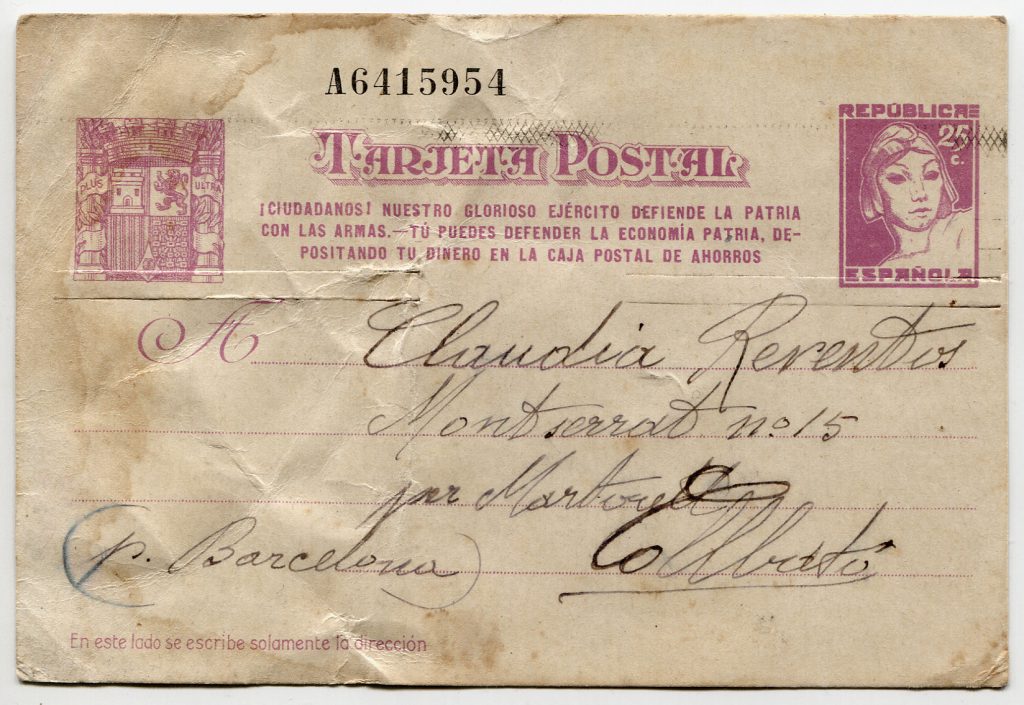

Stationery post card Edifil 80N, with unreadable roller postmark but text on the back dated on June 18, 1938. Again, there is a mention to Poble Espanyol SIM’s headquarters to get packets through it.
Transcription:
.Estimada família: jo estic bé, el mateix espero de vosaltres.
Avui escribim junt am el Josep per dirvos que ens envieu el tabaco tan pronta com el tingeu i el paquet al Poble Espanyol.
Porteume patatas, cebas, oli, olivas, i si eu tret mel. Pel Josep, que no sen a recordad que li portin espardenyas. Porteuens postals.
Nosaltres ens creiem sortí en llivertat molt aviat.
Com que és vespre i anem molt depresa ya ens perdonareu.
Contesteu per carta, dons me agrada molt. Res més. El vostre Juan Jorba.
18-6-38
Translation:
Dear family: I am all right, I hope you too.
Today I am writing with Josep to ask you to send tobacco as soon as you get it, and to send the packet through Poble Espanyol.
Bring us potatoes, onions, olive oil, olives and, if you have, honey. Also shoes for Josep, who didn’t remember to ask for a pair to his people. Bring us post cards.
We think we will be freed very soon.
As it is the evening and we are in a hurry, excuse us [for brevity].
Reply through a letter, as I love it. Nothing eles. Yours, Joan Jorba.
June 18, 1938


Stationery post card Edifil 78n, with no postmark but text on the back dated on July 6, 1938. Another mention to the SIM’s headquarters Poble Espanyol as a way to receive packets.
Transcription:
P.D. Mandarme aceitunas.
Miércoles 6-7-38. Mi querida madre, hermano y abuela. Jo estoy perfectamente, el lunes recibí el paquete que me mandais por el Pueblo Español y lo recibí todo, menos
les cebeslas cebollas y los ajos. El José también recibió el paquete, todo muy bien /En otro paquete ponedme un par de albarcas/. La única equivocación que tuvimos es el pedir el tabaco por certificado, pues aquí tarda mucho en llegar. De manera que ya lo sabéis, que los paquetes ban muy bien por el Pueblo Español. Cuando volváis a llevarlo poner el tabaco que tengáis por el paquete mismo. Sin más que desearos que salut per toda la familia, se despide con un fuerte abrazo, vuestro hijo Juan Jorba.
Translation
PS: Send me olives.
Wednesday, July 6, 1938. Dear mother, brother and grandmother. I am perfectly, on Monday I received the packet you sent me through Pueblo Español and I got everything except the onions and the garlics. José also got his packet, all very well /Send me a pair of shoes in another packet/. The only mistake we did was to ask you to send the tobacco through registered mail, as it arrives here very late. So you know, packets go faster through Pueblo Español. When you send another one put the tobacco you have in it. No more to tell you, just to wish health for all the family, receive a hug from your son Juan Jorba.


Stationery post card Edifil 79n, with no references making possible to deduct from the text that this post card comes out of a labor camp, but in the chronology of the sender, while Joan Jorba was interned.
Transcription:
Joaquim Jorba, 10-7-38
Volgud germà /mara/ i àvia: Per últim, veien que vosaltres no em voleu escriure, os escric cuatra ratllas per dirvos que estic bo i que ahi varex tení carta de la Maria, la meva cosina, que em dia la diricció del Peret. Pensen a escriruem i espliqueume com tic les terrurs i les anyadas.
Res més, una abrasada per tots vosaltres del vostre,
Joan Jorba R.
Translation:
Joaquim Jorba, July 10, 1938
Dear brother, mother and grandmother: finally, as I see you don’t want to write to me, I send you a few letters to let you know I am well and that yesterday I got a letter from Maria, my cousin, telling me Peret’s address. Remember to write to me and let me know how my lands and harvests are.
Nothing more to tell, a hug to you all from yours,
Joan Jorba R.


Stationery post card with Barcelona roller mark dated on Sept 10, 1938 (all SIM’s labor camps correspondence was transferred to Barcelona, to Muntaner 55, and from there it was delivered to the mail. This is why they have Barcelona post marks). The text mentions the end of the packet shipping services throgh SIM’s headquarters in Poble Espanyol
Transcription:
8-9-38
Muy estimada mamá y demás familia: salud como la mía es buena.
Supongo que ya deveis estar enterados de que en el Pueblo Español ya no atmiten paquetes. Certificado por correo me madarás Tercusan y tabaco. No pongas nada de comida, porque es muy caro de certificar.
Hace tres o cuatro días que se a marchado el amigo Bartolomé. Supongo que ya vendrá a verte. Con esta tarjeta te contesto la tuya del 28, que es la última que he recivido.
De tu, Joaquín, estoy muy contento, porque me dices que as plantado tantas coles y monjetas.
Sin más que muchos recuerdos a la familia y tú, junto con Joaquín y yaya, recives un fuerte abrazo de tu hijo.
Juan Jorba
Translation:
September 8, 1938
Dearest mom and family: I wish you are healthy as I am.
I guess you already know that packets are no longer admitted in Pueblo Español. Send me Tercusan* and tobacco via registered mail. Do not put food in the packet, as it is very expensive to send it registered.
Three or four days ago my friend Bartolomé left. I suppose he will come to visit you. With this post card I reply to yours from day 28, which is the last one I received.
I am very happy of you, Joaquín, as you tell me you have planted so many cabbages and beans.
Nothing else to explain, just regards for the family and for you, with Joaquín and granny, receive a big hug from your son,
Juan Jorba
*A brand of a product we couldn’t know what it was.


Stationery post card Edifil 80n. It was not sent from the camp, but from 34 Division, 218 Mixed Brigade instead. Despite this cart is not directly related with SIM’s labor camps, we have found important to add it here as it proves the sender was finally liberated and enrolled a military unit. The date on the text, Oct 27, 1938, marks the end of the chronology that allows to identify other cards by the same person sent from the labor camp number 3, detachment in Tivissa, while he was held prisoner there. It is also linked to the second piece under “Preventorio C” paragraph, sent by the same person on Oct 9, 1938. We can guess he was transferred from the camp number 2 to preventorio C because, most probably, he had to be judged in Barcelona. This last card showing he writes from a military unit makes obvious he was absolved of whatever charges there were against him and he was sent to the army. Unfortunately, we don’t know if this man survived the war, but he survived his internment in labor camp number 2.
Transcription:
En campaña, 26 de octubre 1938.
Apreciada madre y demás familia,
Supongo que ya sabréis que estoy fuera de Terrasa y que estoy muy bien, y que duermo en una casa en el campo, pues no paso frío de nada. Aquí en donde me encuentro hacemos instrucción todos los días. Supongo que por medio de el teléfono ya hos habrán esplicado lo que me pasó en Tarrasa.
Estoy bien de salud, como deseo sea la buestra.
Muchos recuerdos a la familia y V. los reciba de vuestro hijo que lo es,
Juan Jorba.
Mi dirección es: Juan Jorba Rabentós, 34 División, 218 Brigada Mixta, Base de Instrucción, Base 8ª, C.C. Nº 10.
Translation:
In campaign, October 26, 1938.
Appreciated mother and family,
I guess you already know I am out of Terrassa and that I am very well, and that I sleep in a country house, so I don’t have cold. Here where I am we do military instruction evary day. I guess you have been noticed through a phone call about what happened to me in Terrassa.
My health is OK, I wish yours too.
Lots of regards to the family, and for thee too from thy son,
Juan Jorba.
My address: Juan Jorba Rabentós, 34 Division, 218 Mixed Brigade, Instruction Base, 8th Base, C.C. Nº 10
LABOR CAMP NUMBER 3


Stationery post card Edifil 78a with Tàrrega postmark of October 30, 1938, and text on the back dated on October 12, 1938. Sender’s info on the back: Moisés Cabutí Clarabuch, 2ª Brigada, 1er Grupo, Campo Trabajo Número 3.
Transcription:
12-10-38
Muy amada esposa: recibí el paquete con ropa y postales. También he recibido tus misivas de los días 19 y 21. Conforme con todo. De salud, por ahora estoy bien, y deseo lo mismo para todos vosotros.
¿Qué tal pasáis los días por ahí? Estoy muy contento con lo que me dices de que nuestra hija es muy aplicada. Cómetela a besos de mi parte.
Saluda a todos de mi parte y tú, amada mía, recibe el verdadero afecto y un fuerte abrazo de tu esposo,
Moisés Cabutí Clarabuch.
Saluda a hermanos y conocidos.
2ª Brigada – 1er Grupo – Campo Trabajo Número 3
Translation:
October 12, 1938
Dearest wife: I got your packet with clothes and post cards. I’ve also received your letters from 19 and 21. I agree with all. My health is fine at the moment, and I wish the same for you all.
How are your days there? I am very happy with what you tell me about our daughter, that she’s a good student. Give lots of kisses to her.
Greetings to all and you, my love, receive my true affection and a strong hug from your husband,
Moisés Cabutí Clarabucj.
Greetings to brothers and friends.
2nd Brigade – 1st Group – Labor Camp Number 3

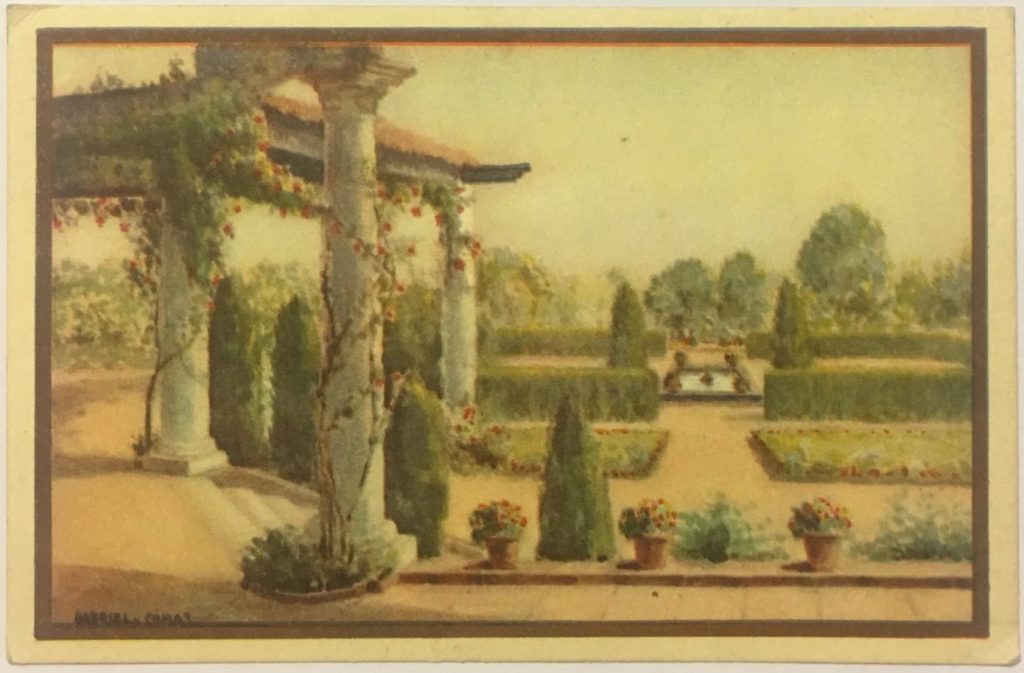
Post card franked with Edifil 749, field post postmarkc “CORREO DE CAMPAÑA C. C. Nº 12” with date November 6, 1938, and Labor Camp Nr 3 mark “MINISTERIOS DE DEFENSA NACIONAL * S.I.M.* / CAMPO DE TRABAJO / Nº3”. Sender’s info on the front: Antonio Bassols Castells, Campo Trabajo nº 3, Muntaner 55.
Transcription:
6-11-38
Inolvidables hijitos:
Estoy bien, deseo igual vosotros. Apenado no recibir noticias vuestras. Espero tenerlas urgente y poder abrazaros pronto.
Saludos a mamá y un sinfín besos abrazos.
Antonio.
Antº Bassols Castells
Campo Trabajo nº 3
Muntaner 55
Translation:
November 6, 1938
Unforgetable sons:
I am fine, I wish you too. I’m sad for not having news from you. I hope to have them urgently and be able to hug you soon.
Greetings to mom and kisses without end.
Antonio.
Antonio Bassols Castells
Labor Camp nr 3
Muntaner 55


Stampless post card, with mark of the camp used as franchise, reading “MINISTERIO DE DEFENSA NACIONAL * S.I.M.* / CAMPO DE TRABAJO / Nº3”. Field post postmark “CORREO DE CAMPAÑA / C. C. Nº ?” dated on November 24, 1938. Texto on the back of the same date. Sender’s info on the front: Antonio Bassols Castells, Campo Tranajo nº 3, Base Muntaner, 55, Barna.
TRANSCRIPTION:
24-11-38
Inolvidables hijitos:
Al fin recibí noticias vuestras, postal 16 cte.
Alégrome estéis todos bien, deseo abrazaros pronto
Recuerdos a mamá.
Os quiere muchísimo, vuestro padre,
Antonio
Translation:
November 11, 1938
Unforgetable sons:
I’ve finally got news from you, post card from 16 of the current.
I celebrate you are all fine, I wish to hug you soon.
Regards to mom.
Love from your father,
Antonio


Post card to Labor Camp nr 3, with no postmark but text dated on November 29, 1938. Return to sender mark “D” (for Devuelta) and pencil handwritten note “Baja” (this can be translated as “no longer in the camp”). Addressee info: Antonio Bassols Castells, Campo de Trabajo nº 3, Muntaner 55, bajos, Barcelona. “Begas” added by the postman requesting the return.
Transcription:
Queridísimo papá: hoy hemos recibido tu postal, alegrándono sepas nosotros. Todos deseamos verte pronto. Seguimos bien. Recuerdos mamá, besos y abrazos de tus hijos.
Carmina, Mª Rosa, Antonio B.
Begas, 29-11-38
Translation:
Dearest dad: today we have received your post card, happy you have news from us. We all wish to see you soon. We are fine. Regards from mom, kisses and hugs from your children.
Carmina, Mª Rosa, Antonio B.
Begas, November 29, 1938


Post card franked with Edifil 749, unreadable postmark but text on the back dated on December 31, 1938. The sender’s name appears in the relation of people interned in the S.I.M. camps, on Appendix 19 of the study by Francesc Badia Els camps de treball a Catalunya durant la guerra civil, page 436. Sender’s info on the back: Juan Recasens, Campo 3.
Transcription:
Hoy 31-XII-38
Queridos todos:
Recibí paquete bien y carta. Yo sigo bien, así lo deseo para todos vosotros. Si podéis mandad alpargatas, pues las que recibí altas me fueron pequeñas y no puedo llevarlas, mi número es el 43.
Daros muchas gracias de los galalits [botones de galalita], me hacen mucho favor.
Esperando vernos pronto os abraza vuestro,
Juan
Remite:
Juan Recasens
Campo 3 Dº [for “Destacamento”]
In brackets and on the left margin: “(postales)”
Translation:
Today, December 31, 1938
Dear all:
I received the packet and the letter. I am still well, and I wish the same for you all. If you can send espadrilles, as those tall I received are small for me and I cannot wear them, my number is 43. I want to give you a lot of thanks for the buttons, they are very useful for me.
I hope to see you soon, recevie a hughe from your,
Juan
Sender:
Juan Recasens
Camp 3 Dº [for “Detachment”strikethrough]
In brackets, on the left margin “(post cards)”

Post card with no stamps and with unreadable military field post postmark. Sender’s info on the front: Alberto Galicia, Campo de Trabajo nº 3, Muntaner nº 55.
LABOR CAMP NUMBER 4

Cover to Carcassonne (France) with mark “MINISTERIO DE DEFENSA NACIONAL * S.I.M.* / CAMPO DE TRABAO / Nº 4” used as franchise, censor Heller RB3.13 and Cervera postmark dated on June 16, 1938. The addressee is Marcel Delpech. This same individual is the sender of another covers listed here (see the cover from France to Labor Camp Nr 4 in this same section, with Carcassonne postmark of November 16, 1938). So possibly the sender of this cover is the guard of the camp Plácido Mor Font.

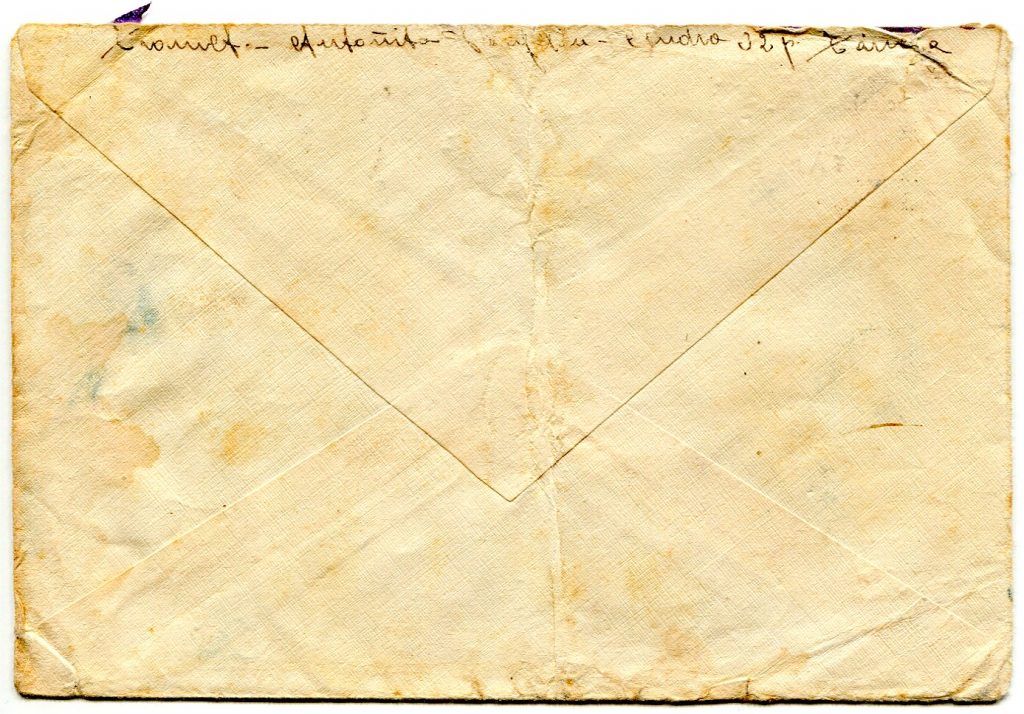
Tàrrega postmark of July 1938 and franchise mark “Se autoriza la circulación / por falta de franqueo” (circulation authorized for the lack of stamps) and the seal “Ajuntament de Tàrrega” (Tàrrega town council seal). Letterhead canceled with ink reading “Associació d’Empleats Municipals / (Adherida a la U.G.T.)”.
Addressed to Pepe Pascual Semis, Camp de Treball Nº 4 / 3ª Secció, 1ª Companyia / Cervera.


Franchise mark “Se autoriza la circulación / por falta de franqueo” (circulation authorized for the lack of stamps) and seal “Ajuntament de Tàrrega (Tàrrega town council seal). Letterhead canceled with ink reading “Comissió de / Seguretat Interior” and Tàrrega postmark of August 1938.
Addressed to Pepe Pascual Semis, Camp de Treball Nº 4 / 3ª Secció, 1ª Companyia / Cervera.
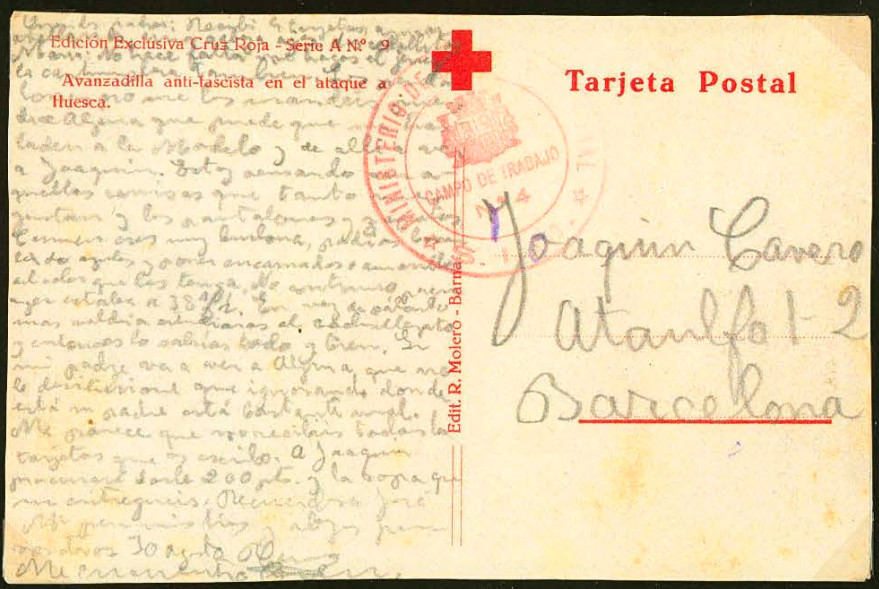

Post card with mark “MINISTERIO DE DEFENSA NACIONAL * S.I.M.* / CAMPO DE TRABAO / Nº 4” used as franchise. Text dated on August 30 [1938].


Cover addressed to a guard in Labor Camp Number 4. The addressee is Plácido Mor Font. Sent through air mail from Carcassonne, France, with postmark dated on November 10, 1938. Barcelona arrival backstamp of November 16, 1938.
Upon arrival the letter is censored, with tape and civilian censor mark Heller RB3.13.
The complete address is as follows:
Plácido Mor Font
Guardia
Campo de Trabajo nº 4
Montjuich
Barcelona
Republique Espagnole
The censor tape partially hides the word “Guardia” in the address, and that caused the confusion that finally made the cover to be returned to the sender, as we will see later.
The cover is directed to the the S.I.M. offices in Montjuïc, and from there redirecte to the SIM post office in Muntaner 55, Barcelona. On the back, handwritten with pen, the redirection to Muntaner 55 was noted. This redirection was signed by M. Sánchez. This forward appears canceled with pencil, and just below there is the same redirection reordered, now authorized by the signature “Brotons”.
In the S.I.M post office the mark “SÓLO SE ADMITEN / TARJETAS POSTALES CON / 20 PALABRAS DE TEXTO” was stamped (only admitted post cards with text of 20 words), and a “D” for “devolution”. Undoubtedly, the partial hiding of the word “Guardia” in the address by the civilian censor tape made the clerk to think it was a cover addressed to a prisoner, and he followed the norm that only allowed the prisoners to receive post cards with a text with a maximum lenght of 20 words. This rule was not allways followed so strictly.
The sender is Marcel Delpech, 6 Rue Montpellier, Carcassonne (Aude), France (see a cover to the sender of this one on this same list, with Cervera postmark dated on June 16, 1938).
Unique cover known to exist addressed to a guard in the S.I.M. labor camps.

Post card with mark “MINISTERIO DE DEFENSA NACIONAL * S.I.M.* / CAMPO DE TRABAO / Nº 4” used as franchise.
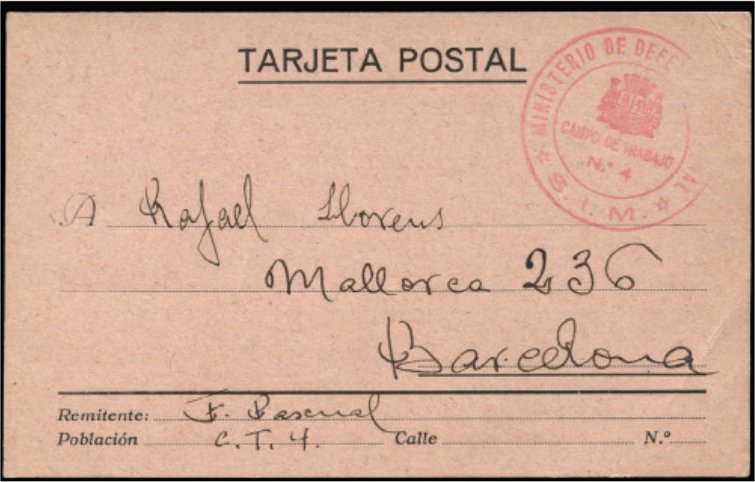
Post card with mark “MINISTERIO DE DEFENSA NACIONAL * S.I.M.* / CAMPO DE TRABAO / Nº 4” used as franchise. Sender’s info on the front: “F. Pascual, C.T. 4”

Improvised post card with mark “MINISTERIO DE DEFENSA NACIONAL * S.I.M.* / CAMPO DE TRABAO / Nº 4” used as franchise.
LABOR CAMP NUMBER 5

Stationery post card from Gibraltar to Guillermo Perea, in Labor Camp Nr 5. Gibraltar roller postmark dated on January 5, 1939. Handwritten redirection to the SIM’s post office in Barcelona, in Muntaner 55, from where it was forwarded to the labor camp.
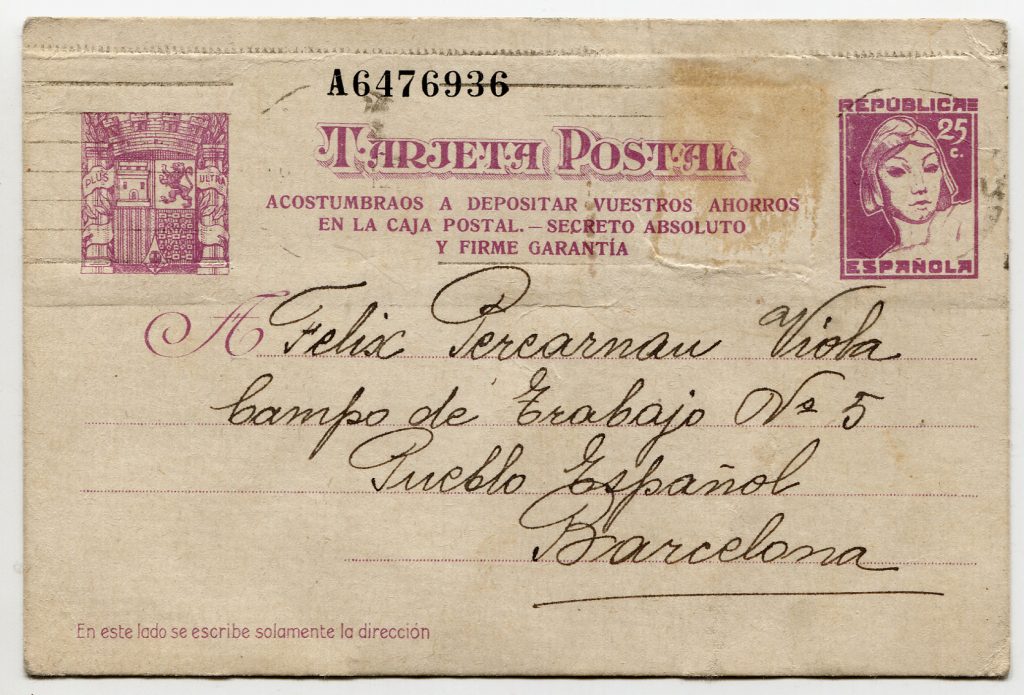

Stationery post card Edifil 79n to Fèlix Perarnau Viola, Campo de Trabajo Nº 5, Pueblo Español, Barcelona. One stamp lacking (possibly a 5c Barcelona local surcharge) and unreadable roller postmark. No date on the back.
Transcription:
Apreciado Félix:
Creo estará ya en tu poder nuestra anterior postal, por la que te habrás informado de nuestro perfecto estado de salud.
Por ahora todos seguimos igual, así como toda la familia y amigos.
Espero que tú también te encotrarás en buena salud.
No se si Paquito te habrá escrito tal como me dijo: hoy le he visto, pero no me he acordado de preguntárselo.
Por el mismo […] postales […] si te han llegado bien para repetir el envío, ya que tengo varias; de no ser así tendré que mandártelas con alguna muda. Muchos besos de mamá, tío y hermanos, amigos y familia. Rosa Perearnau.
Translation:
Dear Félix:
I guess our previous post car may have reached you, so you may know our health is perfect.
A the moment we are still the same, also family and friends.
I hope your health is also fine.
I don’t know if Paquito wrote to you, as he sad he would do: today I’ve seen him, but I forgot to ask.
For the same […] post cards […] if you got them to repeat the sipping, as I have several: if not, I will have to send them to you with some clothes. Lots of kisses from mom, uncle, brothers, friends and family. Rosa Perearnau.
LABOR CAMP NUMBER 6

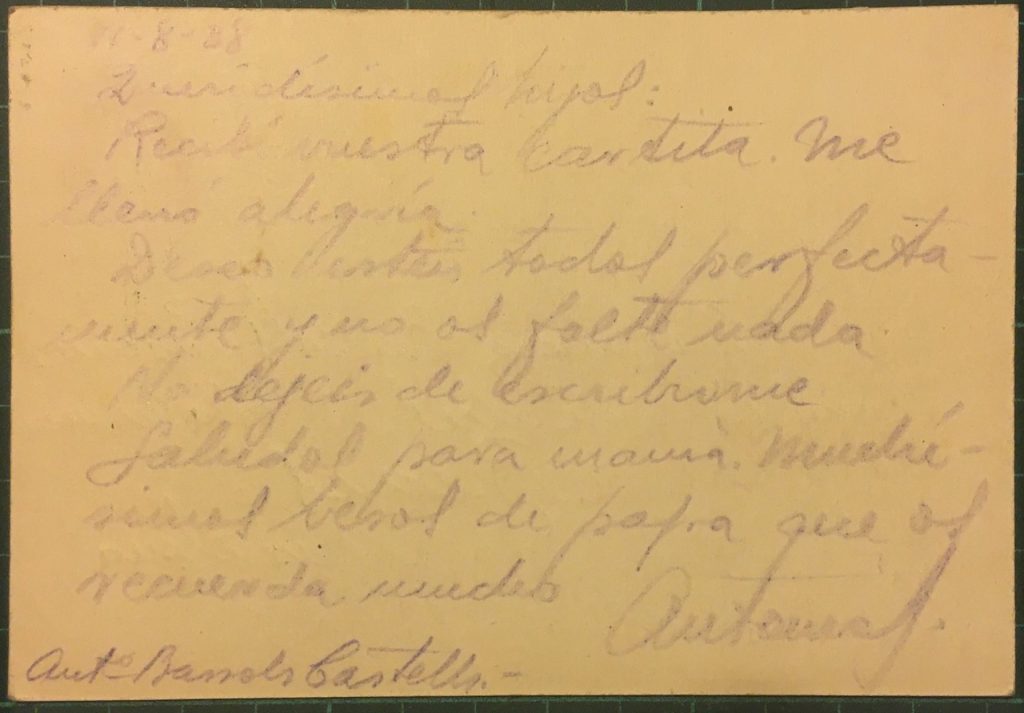
Stationery post card Edifil 78a with Tarragona postmark dated on August 12, 1938. Text on the back dated on August 11, 1938. Sender is Antonio Bassols Castells. No explicit marks from the camp, neither references to it in the text, but presumed to be sent from Labor Camp nr 6, as there is another post card written seven days later by the same individual from this camp.
Transcription:
11-8-38
Queridísimos hijos:
Recibí vuestra cartita. Me llenó de alegría.
Deseo estéis todos perfectamente y no os falte de nada.
No dejéis de escribirme.
Saludos para mamá. Muchísimos besos de papá que os recuerda mucho,
Antonio.
Antº Bassols Castells
Translation:
August 11, 1938
Dearest children:
I received your letter. It fulfilled me with happiness.
I wish you are perfectly and you don’t lack anything.
Do not stop writting to me.
Greetings for mom. Lots of kisses from dad, who remembers you a lot,
Antonio.
Antonio Bassols Castells


Post card franked with Edifil 749 and mark “MINISTERIO DE DEFENSA NACIONAL * S.I.M. * / CAMPO DE TRABAJO / Nº 6”. Falset postmark of August 20, 1938, and text on the back dated on August 18, 1938. Sent by Antonio Bassols Castells.
Transcription:
Querida hijita: te desea mucha salud y felicidades tu papá que te quiere, Antonio. Infinidad de besos para Carmina y Antonio.
Recuerdos a mamá.
18-8-38
Antº Bassols Castells
Translation:
Dear daughter: wishes of health and happines from your father who loves you, Antionio. An infinity of kisses for Carmina and Antonio.
Regards to mom.
August 18, 1938
Antonio Bassols Castells


Cover to Antonio Bassols Castells, Labor Camp nr 6, Muntaner 55, bajos, Barcelona (the SIM post office). Franked with Edifil 749 and Barcelona local surcharge. Barcelona roller postmark of September 9, 1938. Returned to sender with mark on the back “Rehusada por el / agente del SIM” (refused for the SIM’s official) and signature of this official oredring the return.


Post card franked with Edifil 749 and mark “MINISTERIO DE DEFENSA NACIONAL * S.I.M. * / CAMPO DE TRABAJO / Nº 6”. No postmark, and text on the back dated on September 18, 1938. Sent by Antonio Bassols Castells.
Transcription:
18-9-38
Queridísimos hijos: Hace algún tiempo contesté a vuestra muy estimada carta y estoy extrañado no haber recibido nuevamente vuestras amadas noticias, sabiéndoos a todos bien como yo deseos.
Afectuosos saludos a mamá, y para vosotros muchos besos y abrazos de vuestro padre,
Antonio.
Translation:
September 18, 1938
Dearest children: Some time ago I replied to your beloved letter and I am surprised to not having received again your lovely news, as you all know how I wish it.
Warmest regards to mom, and lots of kisses and hugs for you from your father,
Antonio.

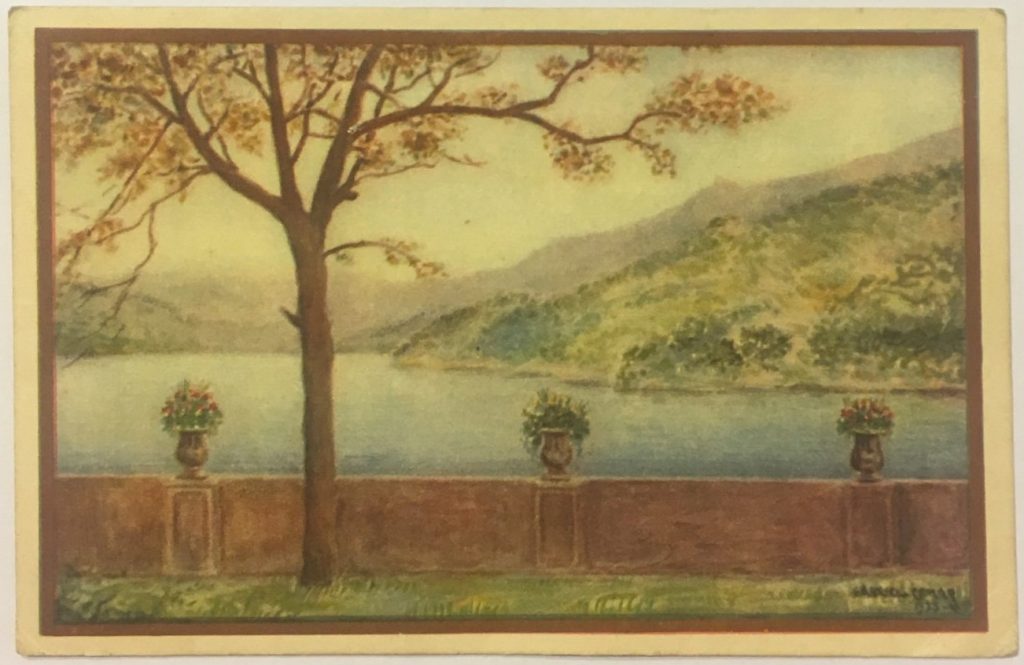
Post card with mark “MINISTERIO DE DEFENSA NACIONAL * S.I.M. * / CAMPO DE TRABAJO / Nº 6”. Stamp missing, but field post postmark partialy readable. Text on the back dated on October 2, 1938. Sent by Antonio Bassols Castells.
Transcription:
2-10-38
Queridísimos hijos: sin más noticias vuestras, espero estéis bien como yo.
Espero pronto abrazaros después juicio.
Un abrazo a mamá.
Muchos besos. Vuestro padre,
Antonio
Antº Bassols Castells
Translation:
October 2, 1938
Dearest childrn: with no news from you, I hope you are well, as I am.
I hope to hug you soon, after the trial.
Hugs for mom.
Lots of kisses. Your father,
Antonio
Antonio Bassols Castells

Improvised post card from Labor Camp Nr 6, Detachment 3 (Cabassers) to Calella. Sent by Alberto Galicia Orcajo. No franking nether postmark. Mark of the detachment of the camp reading “CAMPO DE TRABAJO Nº 6 / DESTACAMENTO Nº 3”.

Stationery post card Edifil 79n to Juan Farnés Porcar, Campo de Trabajo nº 6, Pueblo Español, Montjuïc, Barcelona. Unreadable roller postmark. Redirected to Muntaner 55 (lilac pencil on the right margin) and from there, redirected to a detachment of Labor Camp nr 6 in Porrera (written before the addressee name with blue ink).
CONCLUSIONS
From the text of the post cards we have gathered on this article, we see that discipline in Labor Camp Nr 2 was quite relaxed: prisoners were able to send as many post cards as they wished, with no text extension limit, and they also were allowed to receive packets with goods, only with a few restrictions for non canned food. One of the post cards from this camp even says many prisoners receive those goods personally from their relatives, who bring the packets to the camp. There also is some laxitude referring to the censorship: many of the cards make explicit where are they being written, and in a few cases the name of the town is censored. Labor camp number 3 was an exception. The general rules that applied to all other camps were very though when dealing with inmate’s correspondence. These were the common rules, according to Frances Badia’s study:
Correspondence had to be addressed to direct relatives.
Post cards were mandatory, and covers were not allowed.
A maximum of two monthly post cards of outgoing mail were allowed to each prisoner. No references to incoming mail, which appears to had been unlimited.
Text could not exceed 20 words (name and sender’s address apart).
The content was limited to greet the addressee and tell him how good was the prisoner’s health.
The name of the town where the camp was could not be revealed.
From the 55 pieces we have gathered on this article, only 6 are covers. From these 6, one is sent to a guard (and returned with a mark saying only 20 words are allowed, as he was mistaken for a prisoner), another one is presumably sent by a guard, a third one is sent to the Red Cross in Barcelona and it could be official correspondence, and three are undoubtedly addressed to prisoners. From these three, one is returned to sender and only two were successfuly delivered to a prisoners. Curously, these two covers went to Labor Camp 4, the same as the one addressed to a guard; while the cover for the guard was returned, the cover for the prisoner were delivered.
Where more strictly the text length limit was applied was in preventoriums and in Labor Camp 6.
We have also seen that covers and post cards addressed to the camps are sent to Muntaner 55 and to Poble Espanyol indistinctly, but we also notice that those addressed to Poble Espanyol are redirected to Muntaner 55, and from there, to the camps. And from post cards sent from Labor Camp 2 we learn that prisoners requested to their relatives to ship them goods through Poble Espanyol. This allows the following deduction: while Poble Espanyol was a reception point of packets for labor camps, the correspondence had to go through Muntaner 55. This may explain why all covers and letters addressed to Poble Espanyol are redirected to Muntaner 55. This idea gets reinforced for the fact that those prisoners writting down their sender’s info on their pieces of mail from preventoriums mention Muntaner 55, and not Poble Espanyol. There is only one exception: a post card sent from ‘Palacio de las Misiones’, which was in Poble Espanyol, as it was Labor Camp 1, a transit camp.
Finally, just one thing more: please, note that this article may be enhanced if other pieces of postal history related to the SIM’s camps and prisons are discovered. If you own any and you want to send a picture of it to be included in this article, contact the author through this form.
LIST OF SENDERS AND ADDRESSEES IN SIM’S LABOR CAMPS AND PRISONS MENTIONED IN THE STUDIED POST CARDS AND COVERS
Bassols Castells, Antonio: Stocks agent in Barcelona, born on October 11, 1896. He was in Labor Camps 3 and 6. He survived his imprisonment and died in 1983 (see La Vanguardia, December 18, 1983, page 28.S
Blasi Mora, Ferran: We only know he was in a prison in Girona and in Preventorium A (Montjuïc Castle, Barcelona). He was brother of another SIM’s prisoner, Joan Blasi Mora.
Blasi Mora, Josep: He was arrested for sabotage on August 6, 1937 (see Centro Documental de la Memoria Histórica, Signature DNSD-SECRETARIA,FICHERO,8,B0084681) and he was liberated on February 1939 near the French border, by Division 82 of the nationalist army, after having been transferred to Collell sanctuary when the Labor Camp Nr 2 was moved due to the proximity of the front. See La Vanguardia, February 22, 1939, page 4, “Relación de los liberados procedentes del Collell, atendidos en Olot por la División 82”. After the war we worked as taxi driver, and he died when he was 48 years old, on January 12, 1960, due to a train accident on a crossover in Hospitalet de Llobregat (see ABC, Jan 13, 1960, page 44).
Cabutí Clarabuch, Moisès: He was in Labor Camp Number 3. We haven’t found further references about the sender.
Corbella Amat, Rafael: We can’t tell much about this person, as we have found records from three different people sharing this same name: one was vice-president of centrist political party Partit Republicà d’Ordre de Catalunya, another one was a judge in Barcelona, and the last one was a writer and musician from Vic. The first two are more likely to have ended in Uruguay prison ship, due to their responsibilities. He was in Preventorium E, prison ship Uruguay.
Farnés Porcoi, Juan: We haven’t been able to locate any documents referring to this individual. He was in Labor Camp 6, Porrera detachment.
Galicia Orcajo, Alberto: He was in Labor Camps 3 and 6, 3rd Detachment. See Francesc Badia: “Els camps de treball a Catalunya durant la guerra civil (1936-1939), page 414.
González del Río, Julio: We have found no records about this individual. He was in Labor Camp Nr 1.
González Juan, José: Retired Engineers lieutenant colonel (see La Vanguardia, Mar 12, 1933, page 4), who whas detained in April 1937 for being a fifth columnist and a falangist (see La Vanguardia, April 17, 1937, page 3). He was in Preventorium C (Barcelona’s seminar).
Jorba Rabentós, Joan: We have few info about this individual. Apparently, he was from Collbató and he was in Labor Camp Nr 2 and in Preventorium C (Barcelona’s seminar). He was freed and enroled the Republican army, with 34 Division, 218 Brigada Mixta, Base de instruccion, Base 8ª.
Mor Font, Plácido: Guard in Labor Camp Nr 4 (see Gazeta de la República Nr 154, June 3, 1938, pages 1177 & 1178 (row 124 on page 1178).
Pascual Semis, Pepe: Was sentenced to “maximum reclusion” by the Tribunal Popular of Lleida (see La Vanguardia, October 1, 1936, page 7) and he survived his imprisonment in Labor Camp Nr 4 (he was appointed Asesor Provincial de Campamentos y Albergues in a notice in the bookled “Organizaciones Juveniles, nr 1, 1940). This individual appears in the list of prisoners on apendix 19 of the work “Els campos de treball a Catalunya durant la guerra civil (1936-1939)”, by Francesc Badia (page 432).
Perea, Guillermo: We couldn’t gather any other information about this individual except he was in Labor Camp Nr 5.
Perearnau Viola, Fèlix: Printer from Barcelona. He was judged for desertion by a military court in Barcelona. The state prosecutor requested a sentence of 20 years in labor camps (see La Vanguardia, April 1, 1938, page 5). Interned in Labor Camp Nr 5. He survived his captivity and died on August 30, 1988 (see his obituary on La Vanguadia, August 31, 1988, page 16).
Recasens Ventosa, Joan: Industrial. From Tarragona. Interned in Labor Camp number 3 in Omells de Na Gaia. The newspaper La Vanguardia, on its March 25, 1938 edition, page 4, also publishes a note by the Catalan Court for Espionage and High Trason explaining that the sender was sentenced to 25 years in labor camps.